Author: crystalnyf
Luxury Cashmere Brand CASHE Announces Partnership with NYF!
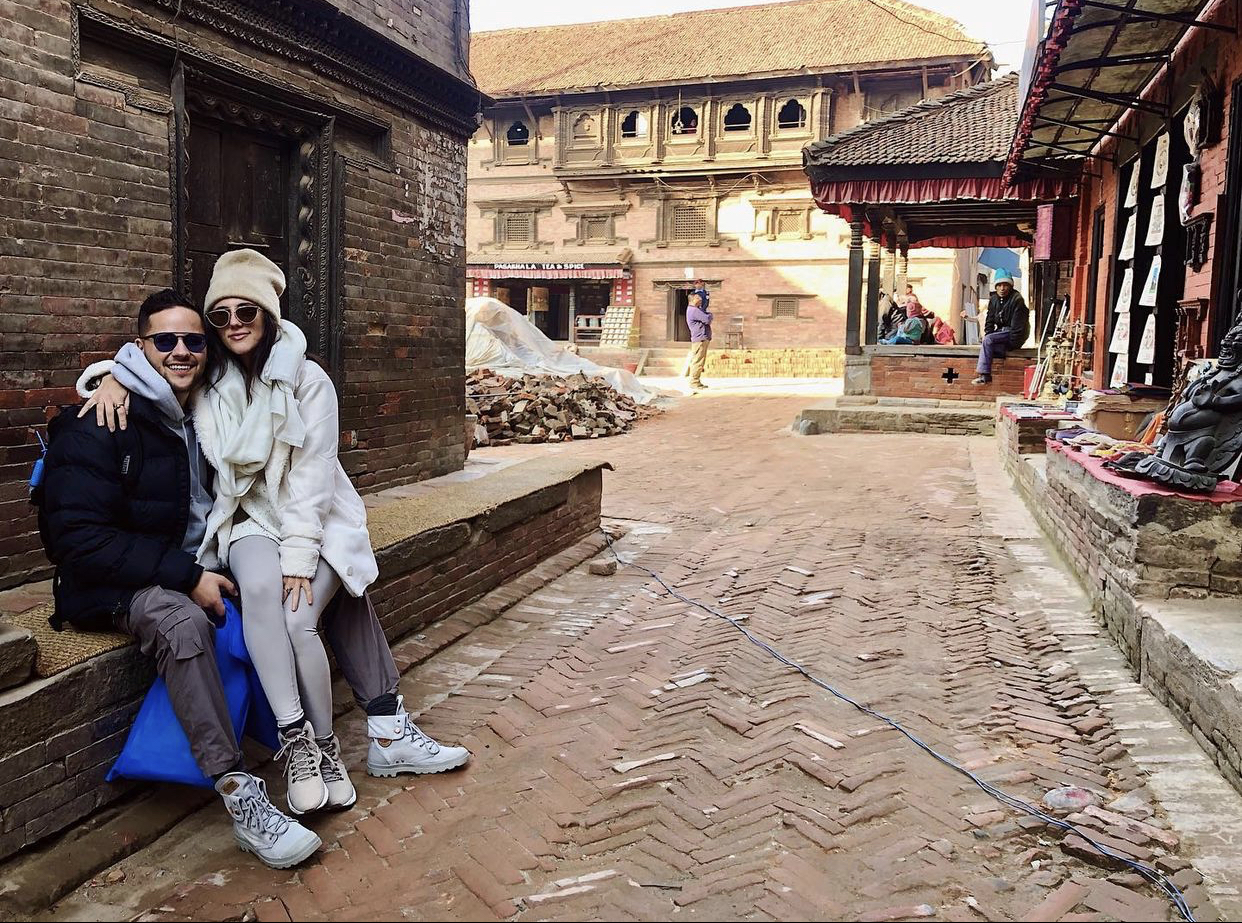
Luxury cashmere is a point of national pride in Nepal. Each artisan’s traditional craftsmanship is unique—the result of generations of dedication. This strikingly beautiful textile—thinner, warmer, and softer than traditional sheep’s wool—has captivated the world for centuries.
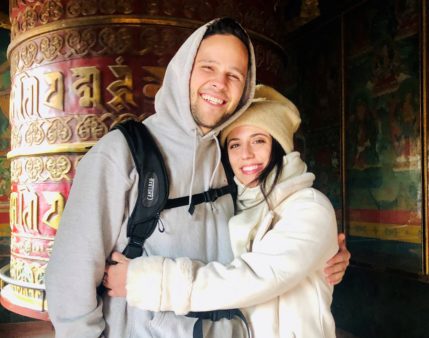
Namasté, NYF friends! We’re Giulia Giancola and Vlad Litinetsky, co-founders of CASHE. Designed in Los Angeles and handcrafted in Nepal, CASHE is an ode to the spiritual and skilled craftsmen and women we met on a trip to Nepal’s Durbar Square in December 2019. The moment we began sifting through handmade cashmere sweaters, blankets, and scarves, we decided to bring the high-end knitwear home to launch a mindful brand of our own. Our mission is to connect citizens of the world to fine Nepali cashmere.
We’re so proud to be announcing our partnership with NYF! Philanthropy is tightly woven into CASHE’s direct-to-consumer business model, introducing a unique and natural connection between Nepal and consumers worldwide. 10% of all our proceeds are donated to NYF.

When we launched CASHE in early 2020, we chose to build on the foundations of sustainability, philanthropy, and craftsmanship. We aspire to create an impactful connection between ourselves, our customers, and Nepal by sourcing and partnering with local craftspeople across Kathmandu who devote their lives to the art of bringing forth the world’s finest cashmere. You can read more about our story and our ideals here.
Luxury cashmere is much more than a product—it’s a cultural tradition guided by generations of human ingenuity. We’re still collaborating with our tour guide and friend, Bipin, who noticed our fascination with authentically-crafted cashmere and guided us deeper into this timeless world.
As we explored Nepal, from the Kathmandu shops where cashmere crafts are sold, to the Dhulikhel highlands where cashmere goats live out their lives, our adventure trip evolved into a brand.
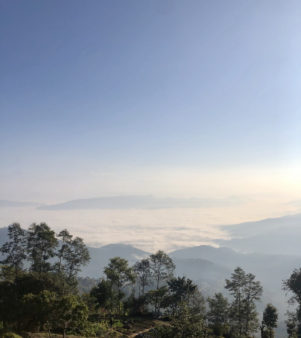
The views in Dhulikhel are unlike any in the world. Cashmere goats and their human caretakers have enjoyed these views for generations, warmed in the cold winter by the unique wool prized across the world.
Each story Bipin told, and each vender we met, deepened our connection to the people driving the cashmere industry in Nepal. CASHE takes pride in ethical sourcing and offering cruelty-free collections of undeniably premier, sustainable and delicate luxury cashmere styles. We are committed to Fair Trade: fair wages and equal pay for equal work to women and men, safe and empowering work conditions, environmental stewardship, and respecting cultural identity.
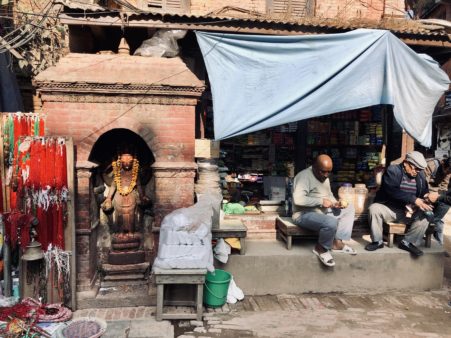
In 2019 Kathmandu, the past and present intermingle. Hidden within each shop are treasures generations in the making.)
CASHE is grateful for the opportunity to support the communities who fight so hard for their traditions and trades.
And we want to do more.
CASHE and NYF are currently collaborating on a variety of creative and educational projects in support of Nepalese women and children. In partnership with NYF, CASHE is producing a short, powerful docu-film capturing the life stories of two Nepali women and their experiences balancing motherhood and work. These stories—of one woman proudly supporting NYF’s foundational efforts and another working in manufacturing producing CASHE cashmere—weave together to illuminate the beauty of Nepal’s culture, traditions, and the undeniable strength of Nepalese women.
This project is slated to roll out on International Women’s Day 2021. CASHE is in talks with a variety of digital distribution partners for media exposure.
CASHE has been featured in a variety of publications in the last few months, including a coveted highlight in the latest British Vogue!
Luxury cashmere from CASHE was also included in holiday gift features in People, PopSugar, W Magazine, Town & Country, Byrdie, and Brit + Co. Giulia’s work at CASHE was featured on Guest of a Guest.
Wherever possible, we highlight our partnership with NYF.
Luxury cashmere is only the beginning—and CASHE has been an incredible, gratifying journey so far. Check back soon for more information on our Valentine’s Day celebrations!
Thank you for being on this journey with us!
-Giulia & Vlad
Vaccines for COVID-19 Arrive in Nepal!
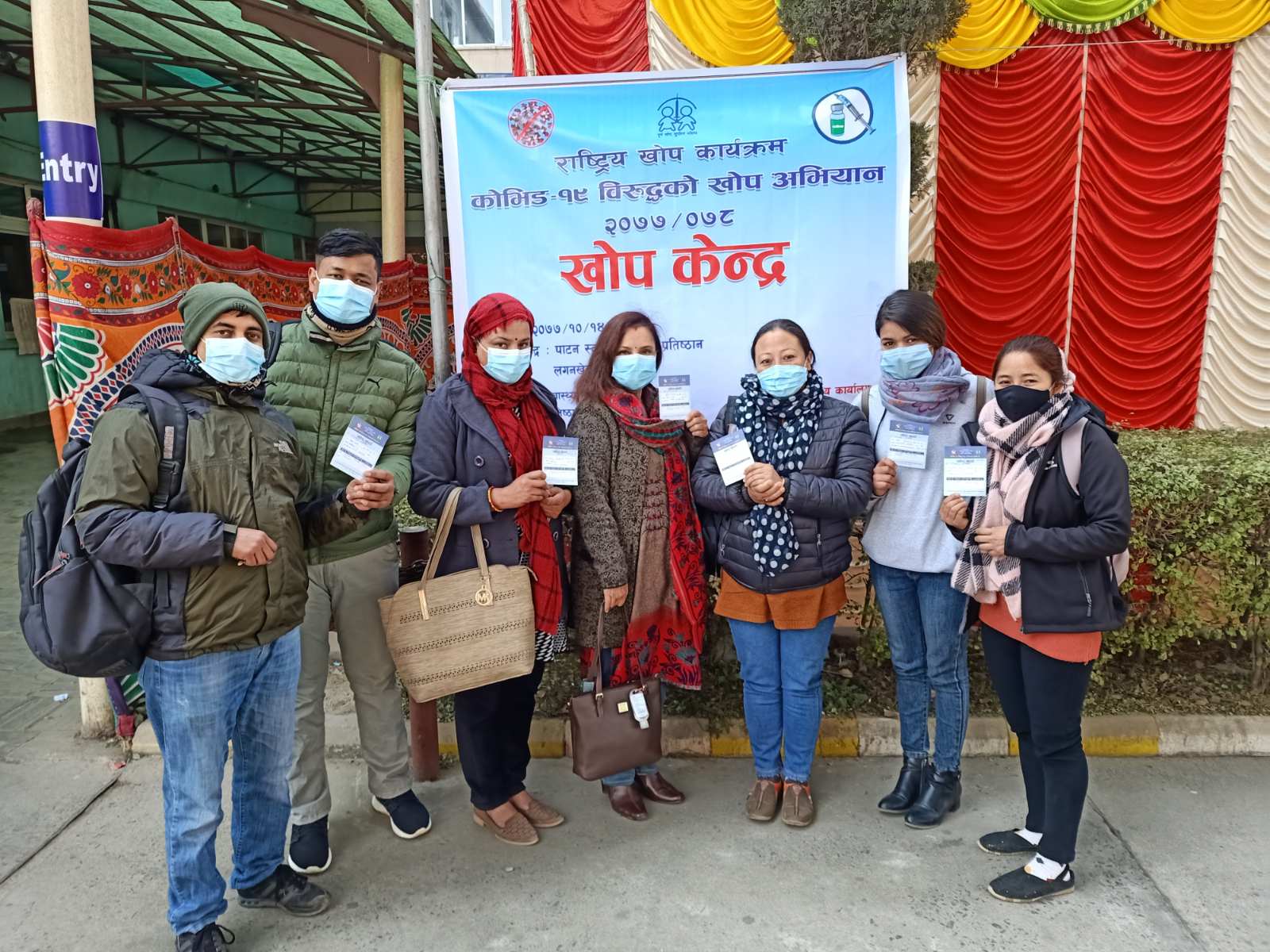
Nepal has successfully secured COVID vaccines through donations from neighboring countries! We’re excited to share that they have started administering the vaccines to high-risk groups and essential service providers.
All NYF staff members at the Nutritional Rehabilitation Home and the New Life center have received the vaccine, and the staff at Olgapuri Children’s Village are in the process of receiving it.
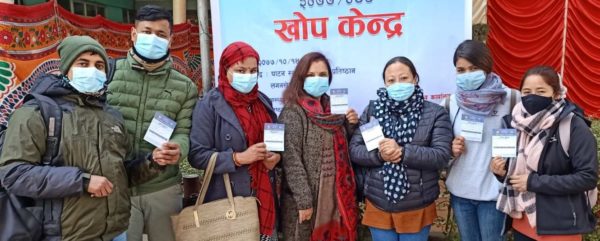
In early February 2021, our Nutritional Rehabilitation Home staff members display their newCOVID vaccine cards.
We will continue the Lito for Life program until this nutritional support is no longer needed in hard-hit communities. But except for Olgapuri Vocational School (which will require extra safety measures), all of our programs have cautiously resumed operations!
Thank you to the NYF community for making all of this possible, and for supporting our work during these difficult times. Dhanyabad!
Maghe Sankranti, NYF and Freed Kamlaris Celebrate 20-Year Journey
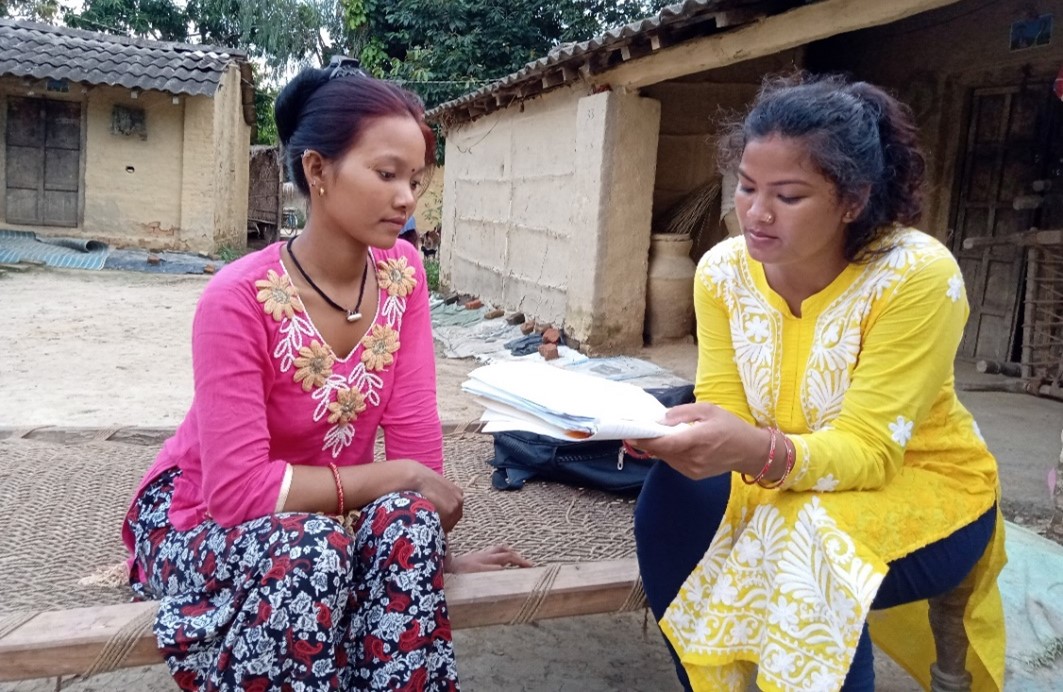
Maghe Sankranti 2021
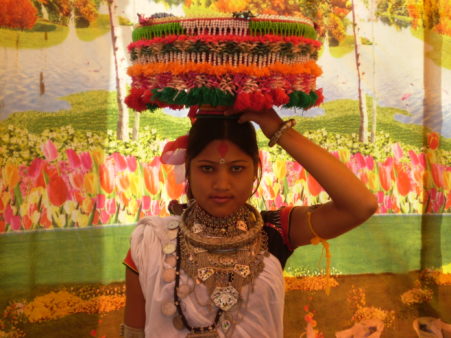
(Above, Jamuna Tharu, a Freed Kamlari and social motivator, prepares to celebrate Maghe Sankranti in 2009.)
Maghe Sankranti – The Tharu people in Nepal’s Terai region celebrate their New Year on Maghe Sankranti, which falls in mid-January. In 2021, that day was January 14th. Happy New Year!
For generations, this auspicious day had a grim meaning for young Tharu girls. Maghe Sankranti was the day the year’s debts came due. On this day, many families settled their debts in the only way available to them: by bonding their young daughters for a year of indentured servitude in the homes of strangers in Nepal’s urban areas. For these girls, some as young as five or six years old, “Happy New Year” meant goodbye to the safety of home—and a frightening journey to a life of kitchen slavery, dehumanization, and abuse. Bonded girls were known as kamlari.
But now, the girls freed from this practice are grown up and ensuring freedom and justice for their sisters. As the Freed Kamlari celebrate Maghe Sankranti this year, they are celebrating hard-won victories built over the past 20 years—including the certainty that the daughters of their minority ethnic group will never again be bonded away.
NYF began fighting the kamlari practice in 2000, with Som Paneru, Olga Murray, and Man Bahadur Chettri leading the way in developing long-term, targeted programming designed to free, heal, educate, and empower the individual girls and to challenge Nepal’s government to eradicate the practice once and for all.
Nepal’s government made the kamlari practice illegal in 2013.
In 2020, we published a three-part series celebrating the Empowering Freed Kamlari program’s transition to Tharu control, the rising leaders of the Kamlari Movement, and the ways the Freed Kamlari Development Forum is providing community support during COVID-19.
Today, NYF is proud to share another resource with the NYF Family: an in-depth study on the impact of our 20-year efforts to empower young women impacted by the kamlari practice.
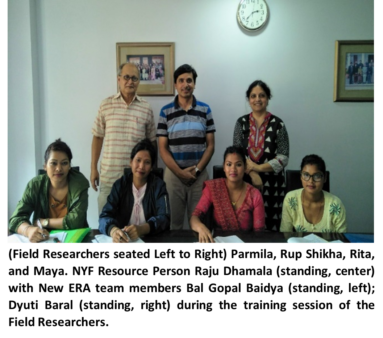
Click here to download the full independent study!
This study was conducted by an independent group of field researchers in 2019. They interviewed a sample of the women freed from the kamlari practice through NYF’s efforts, focusing their questions on topics linked to NYF’s mission: health, shelter, education, and freedom/empowerment.
During the 20-year Empowering Freed Kamlari program, NYF rescued 12,932 girls from domestic bondage. At NYF, we try to focus on individual stories as much as possible. But what about the other thousands of individuals served? If you’re interested in statistics about the broader impacts of our work, please read on!
We’re proud to report that the findings were incredibly positive! In almost all cases, the Freed Kamlaris and their families were not only doing better than they had before NYF intervened—they were doing better than national averages!
Here are just a few highlights:
Health
Other than offering mental health services through Ankur Counseling Center, the Empowering Freed Kamlaris program was not focused on health or health services. But researchers were surprised to discover the ripple effects of NYF’s focus on education.
Women impacted by the Empowering Freed Kamlaris program report much higher than average access to health education and resources for themselves and their families. For example…
Freed Kamlaris are having fewer children than their mothers did—an average of 1.5, which is lower than the national average. They report using family planning methods to ensure their families don’t grow larger than they can support.
Of the Freed Kamlaris with children, 88.7% delivered their last child in a healthcare facility, 97.2% had at least one prenatal checkup, and 82.4% had four or more prenatal checkups. A whopping 93.4% had had all of their children fully immunized as recommended for their age. All of them had had their children at least partially immunized.
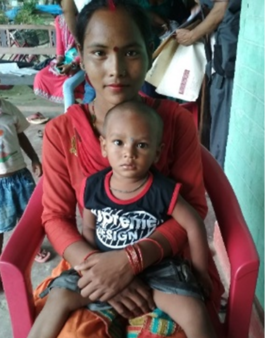
(Above, a 20-year-old married Freed Kamlari shows off her one-year-old son during her interview.)
Shelter
Extreme poverty was the main reason families reported for bonding their girls into the kamlari practice. NYF worked to ensure better economic resources for the girls we served, but home-building was not part of our programming.
Yet now, over 80% of Freed Kamlaris and their families live in homes constructed at least in part with “improved” materials. This includes at least one (and often a combination) of materials like galvanized sheet roofing (instead of thatch), cement or stone flooring (instead of earth), and brick or cement walls (instead of mud or bamboo).
Additionally, 90% of these families have access to sanitation facilities (plumbing) within their homes. Of the 9.5% using outhouses instead, many reported that this was intentional. Such facilities inside the home can be considered “polluting” for religious and cultural reasons, and many of the Freed Kamlaris rescued in early years reported that being forced to clean modern toilets was among their most demeaning experiences as kamlari.
When asked about their household’s main source of energy for lighting, 91.3% used electricity—a high proportion, indicating relative affluence. But 6.5% of the Freed Kamlaris surprised the researchers by reporting their use of solar panels! Off-the-grid energy sources were so unexpected, they had to be added to the list of options on field researcher questionnaires.
Improved housing is one of many ways these empowered women have leveraged their education and economic power to better their own lives.
Education
Education was a primary focus of NYF’s Empowering Freed Kamlari efforts from the very beginning. The earliest girls rescued returned home because NYF promised their families a piglet or goat in exchange for their daughters’ freedom to live at home and attend school.
The response was so strong that classrooms in the Terai region of Nepal were soon overwhelmed with too many students. Some in local government complained that NYF was causing problems for the school system! NYF responded by building 61 additional classrooms between 2004 and 2014 as well as ensuring schools had access to sufficient trained teachers, toilets, drinking water tanks, and furniture.
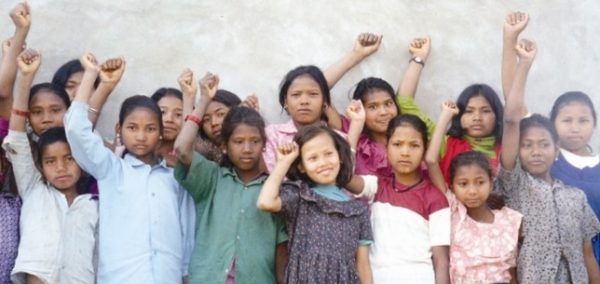
(Above, a group of newly-freed Tharu girls prepare to enter school in 2003.)
NYF also established and ran “catch up” classes to help young girls deprived of early education during their kamlari years. These courses ensured students could succeed alongside classmates close to their own age, instead of forcing teenagers to attend school with kindergarteners.
Now, Nepal’s national literacy rate stands at 67%. Among Freed Kamlaris, literacy is at 97%.
The average Nepalese adult today has completed 4.9 years of education. Among Freed Kamlaris, the average is 8 years—and rising, as 22.4% of Freed Kamlaris are still in school! About 30% of these women have completed grade 10 (the rough equivalent of finishing high school in the US).
Nearly two-thirds of the parents of Freed Kamlaris—61%!—had begun sending their sons to school once they saw their daughters going.
About one in three Freed Kamlaris have completed a vocational training course or received technical education in a field like engineering, computer technology, health care, dressmaking, poultry farming, or screen printing.
Around 4,000 Freed Kamlaris have received additional training through NYF in community leadership, cooperative management, organizational development, and entrepreneurship.
Just under 90% of Freed Kamlaris named educational opportunity as a way their rescue had improved their lives.
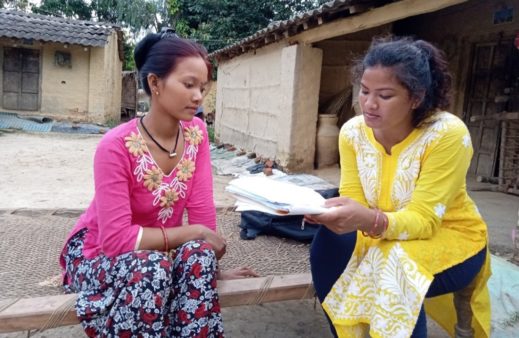
(Above, a Freed Kamlari, in pink, tells a field researcher about life since her rescue. All of the field researchers were women fluent in the Tharu language.)
Freedom
In many cases, freedom comes from education and economic empowerment.
Family members of the Freed Kamlaris reported that 92.3% of these women are currently contributing to household expenses (and remember, this includes the 22.4% who are attending school!). A similar number—91.1%—said that their family’s economic condition had improved in the last 10 years.
These families say the economic improvement came from their newfound ability to buy their own farmland or rent a larger area of sharecropped land, from the ability to start small businesses, or because of the employment of a family member.
About 29% of Freed Kamlaris are either employed or own a nontraditional business, including nontraditional crops like henna and mushrooms. This may seem like a low number, but the Tharu people are primarily a culture of farmers—so 29% is an enormous uptick!
Those Freed Kamlaris who have chosen to continue following the agricultural path are reporting huge advances as well. A full 75.1% of their families grow enough food to make their families entirely or almost entirely self-sufficient year-round through farming alone—an enormous blessing in tough economic times like the world is experiencing now.
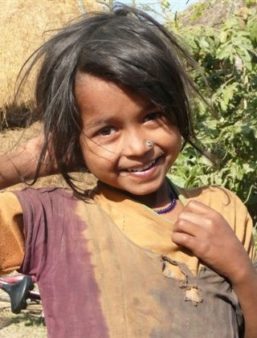
(Above, a young Tharu girl grins at the camera. Taken during the early years of NYF’s involvement with the Tharu people, this photo captures a moment very soon after this child’s return from her time as a kamlari.)
But freedom is also an internal experience—confidence in oneself and the ability to make decisions.
Researchers asked Freed Kamlaris whether they were allowed to make decisions in important areas of their lives: what age to marry, who to marry, whether or not to attend school, subjects to study in school, what career or job to pursue, and how to spend one’s earnings.
The area of least empowerment was what age to marry—90% of Freed Kamlaris were empowered to choose when to marry. (A main focus for the Freed Kamlari Development Forum is combatting early marriage in the region.)
When asked about subjects to study in school, 100% of these remarkable women reported they were empowered to make their own choices.
Freed Kamlaris were also found to have a high level of self-confidence that surprised the Nepalese researchers. These women were much more confident in themselves and their futures than the average Nepalese adult! The researchers also noted that this high confidence went hand-in-hand with grounded, realistic thinking.
A full 84.5% of Freed Kamlaris believed that their lives would improve over the next 5 years—and none believed they would be worse off.
Over 2/3 believed they would be able to take better care of their families in 5 years, and 54.7% saw themselves becoming more self-confident during the same time.
Ten percent of Freed Kamlaris hold leadership positions in community groups, and 21.5% are involved in social activism focused on the kamlari movement, ending violence against women, and ending early child marriage.
At NYF, we have so much to celebrate this Maghe Sankranti!
Thank you to every NYF donor for each thoughtful gift you have invested into these women and girls over the past 20 years. Your love—offered in the form of piglets, scholarships, start-up funds, vocational training, word-of-mouth, and so much more—have built opportunities and strength for a generation of young women. Dhanyabad! We are so grateful for your belief in these girls.
Now, 20 years after Som and Olga learned of the kamlari practice in Western Nepal, the journey continues for these incredible women as they step forward with new independence. The program’s valuable work is being carried forward with strength by the Freed Kamlari Development Forum—a Terai-based nonprofit led by the Freed Kamlaris themselves.
At NYF, we’re excited to step forward as well, putting 20 years of expertise to good use helping empower women and girls through new and continuing programming! We’re using the lessons learned over 20 years to continue serving communities of children throughout Nepal, ensuring their access to Health, Freedom, Shelter, and Education.
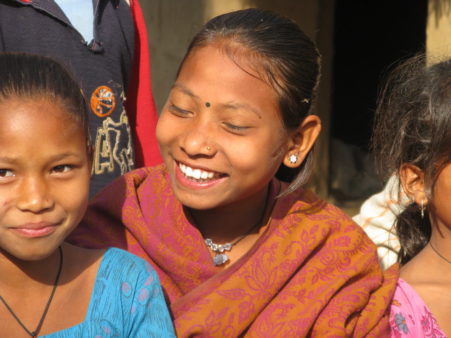
A freed girl grins in a bright moment during a 2009 celebration of the Freed Kamlari movement’s progress. Nepal would not make the practice illegal until 2013, but this girl knew the future was bright and change was on the horizon.
Nepali Tea Traders is Partnering with NYF for the 2020 Holidays!
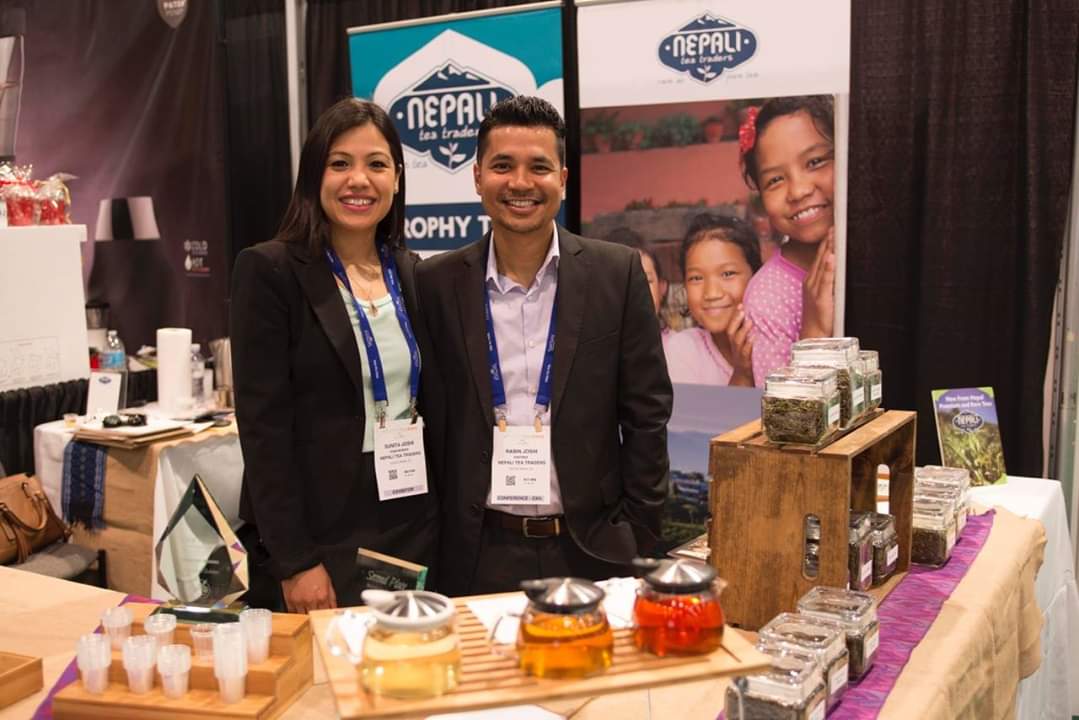
Namasté, NYF Friends!
By Nepali Tea Traders (NTT), co-owners Sunita and Rabin Joshi
Nepali Tea Traders, a Boston Massachusetts based and woman-led business was the first company in the United States to offer premium teas exclusively from small farms Nepal’s Ilam region. Our natural, organic teas grow at ideal altitudes between 4,000 and 8,000 feet—and it shows. Four of our teas have earned North American Tea Championship honors. In 2015, our Himalayan Golden was named the world’s best black tea.
At Nepali Tea Traders, our mission is to help build a sustainable tea economy in Nepal, providing Nepal’s tea farmers fair prices and their fair share of the profit. You can learn more about our story and Nepal’s fascinating tea industry in this spotlight from the New York Times.
Our company focuses on addressing the root cause of Nepal’s need for aid. In the meantime, we’re proud to also support intentional, loving nonprofits like NYF.
That’s why this December, Nepali Tea Traders is donating funds to Nepal Youth Foundation to provide children with better access to shelter, healthcare, and education.
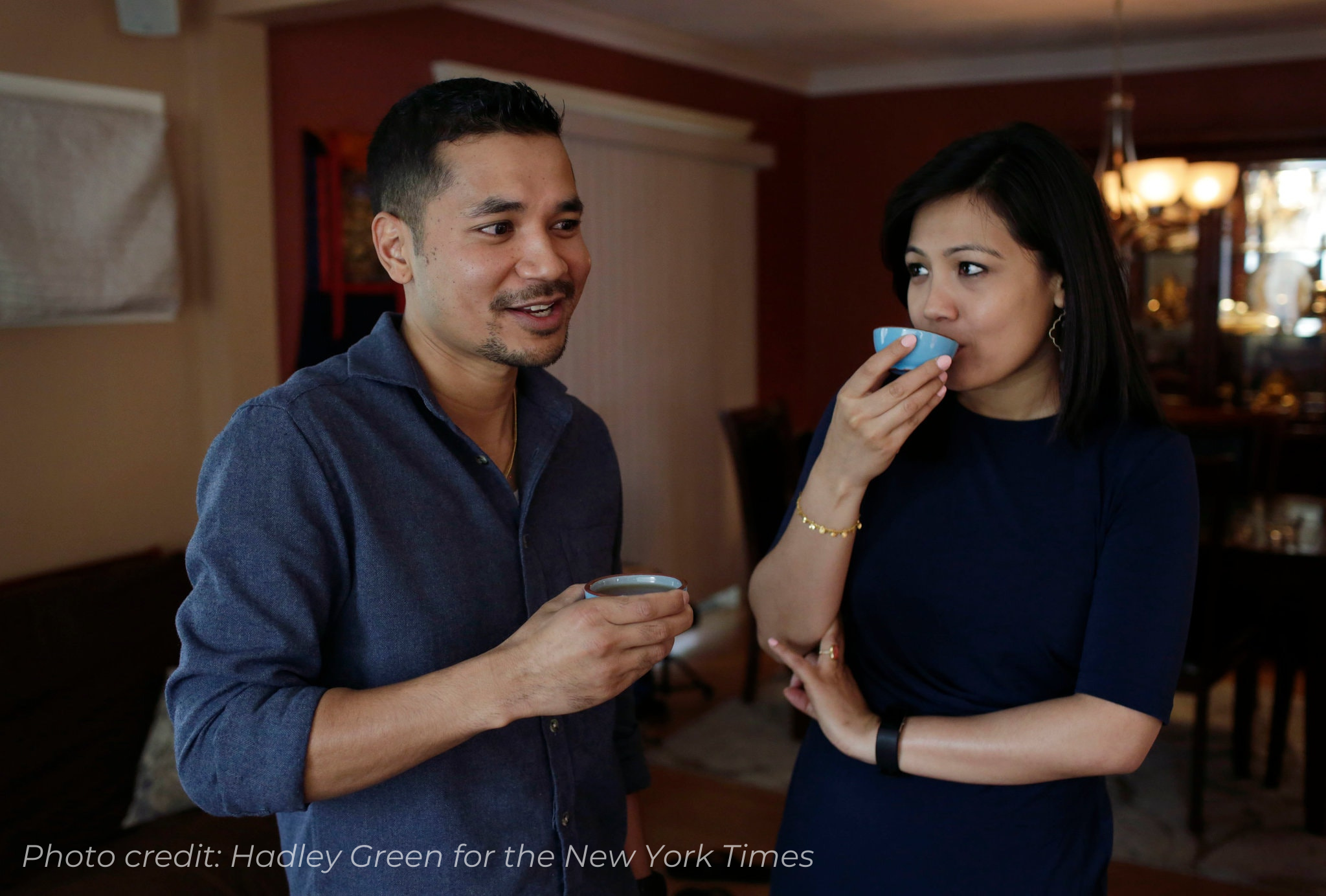
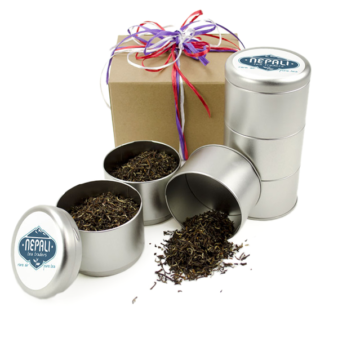
NTT has supported NYF for years. Now, we’re renewing our commitment, knowing that support can be particularly meaningful given the challenges of COVID-19. Along with offering a $1 donation for each purchase of tea made this month, NTT is offering a gift of tea that also includes a $25 donation to NYF (A Gift of Tea Plus Donation to Nepal Youth Foundation). What a great way to give a generous gift to Nepal while providing a unique and healthy present to a family member, friend, or work colleague.
NTT Operates on a Principle of “Trade, Not Aid”
Companies and nonprofits work hard—and with great intentions—to alleviate the challenges Nepal faces. For the longer term, NTT works to ensure sustainable income for the farmers producing the world’s finest teas. Building a sustainable tea economy improves lives in Nepal.
After the 2015 earthquakes, we wanted to help build long-term solutions for the thousands of Nepalis impacted. Both of us are originally from Nepal, so we wanted to do something for our beloved country as it reeled from the devastation. But Nepal needed more than charity to rebuild and make long-lasting change to systemic problems.
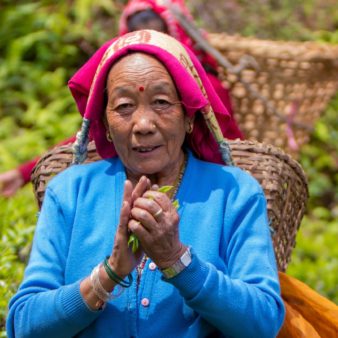
It became clear that we needed to use our business experience to give back to our homeland.
We found the perfect way to do just that when we discovered Nepali Tea Traders.
By sourcing premium teas directly from small farms in the mountains of Nepal, we ensure that all farmers receive a fair price for their teas and get their fair share of the profits, which they can reinvest back into their farms.
NTT also helps educate farmers about sustainable farming practices. This ensures that their farms and crops continue to thrive, providing a livable income for years to come. (Fun fact: tea bushes can live up to 2,000 years, making it a perfect sustainable crop!)
We knew that NTT was the perfect place to blend our entrepreneurial spirit and our vision of giving back to Nepal—so, in 2017, we became the first Nepali co-owners of Nepali Tea Traders.
Steeped in a Shared Mission
NTT’s focus on “trade, not aid” and the associated benefits complements NYF’s mission of providing healthcare, education, and shelter to the country’s youth.
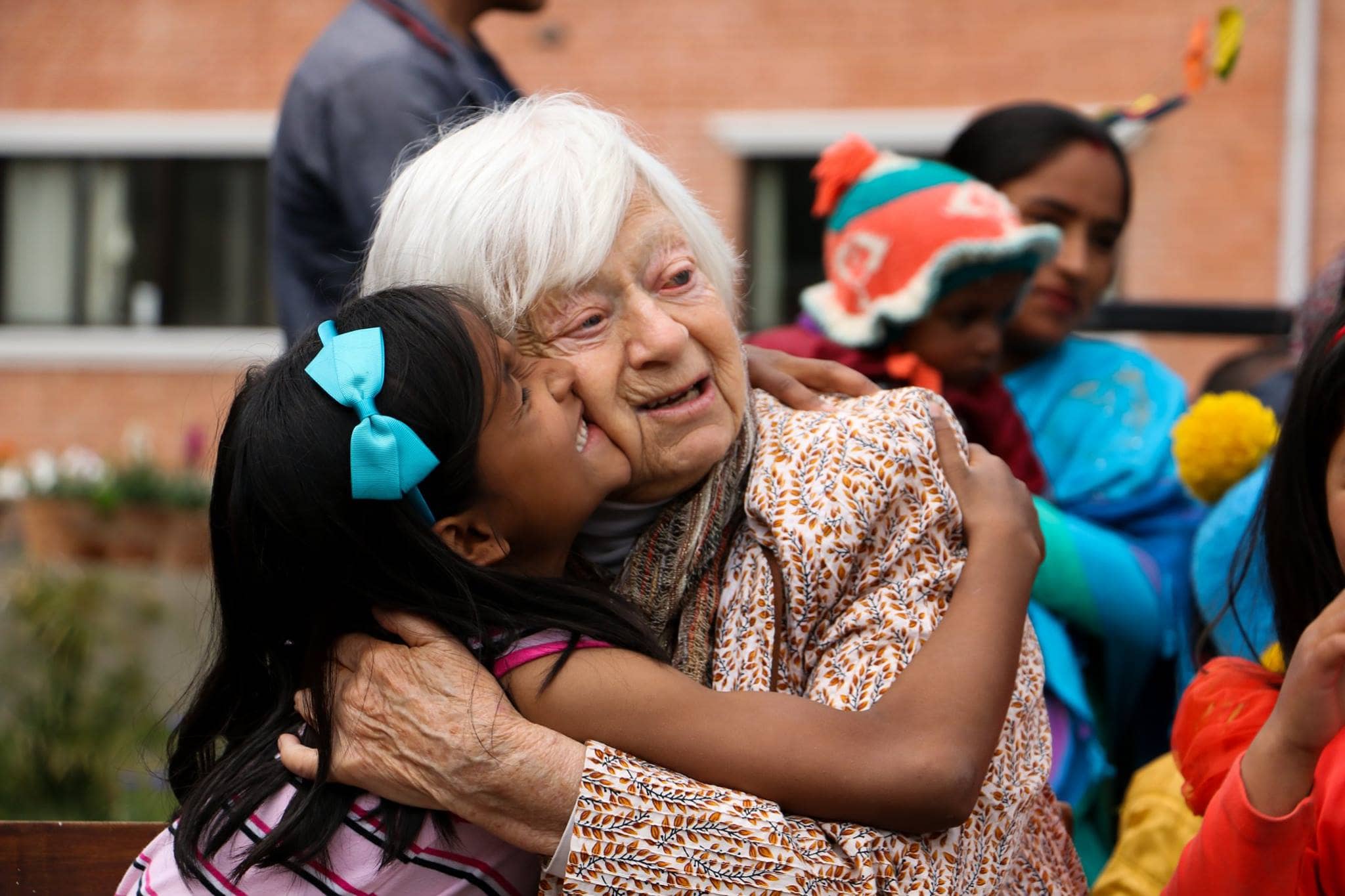
Like NYF, Nepali Tea Traders believes in family compensation that enables children to attend school rather than work in the fields. This is especially relevant to women, since only 15% of Nepali girls complete secondary education.
We believe in the power of economic empowerment for families and communities. The best solutions are those that allow individuals to build their own futures and chase their own dreams.
It’s no wonder that our organizations have partnered, working to empower girls and provide opportunities for lifelong betterment. In fact, NTT just recently invested a portion of its profits to send Nepali girls to school.
Support both NYF and NTT – 2 Gifts in One
For the month of December 2020, Nepali Tea Traders is donating $1 to NYF from each purchase. If you’d like to give a gift of tea, while directly supporting NYF, you can click here: A Gift of Tea Plus Donation to Nepal Youth Foundation
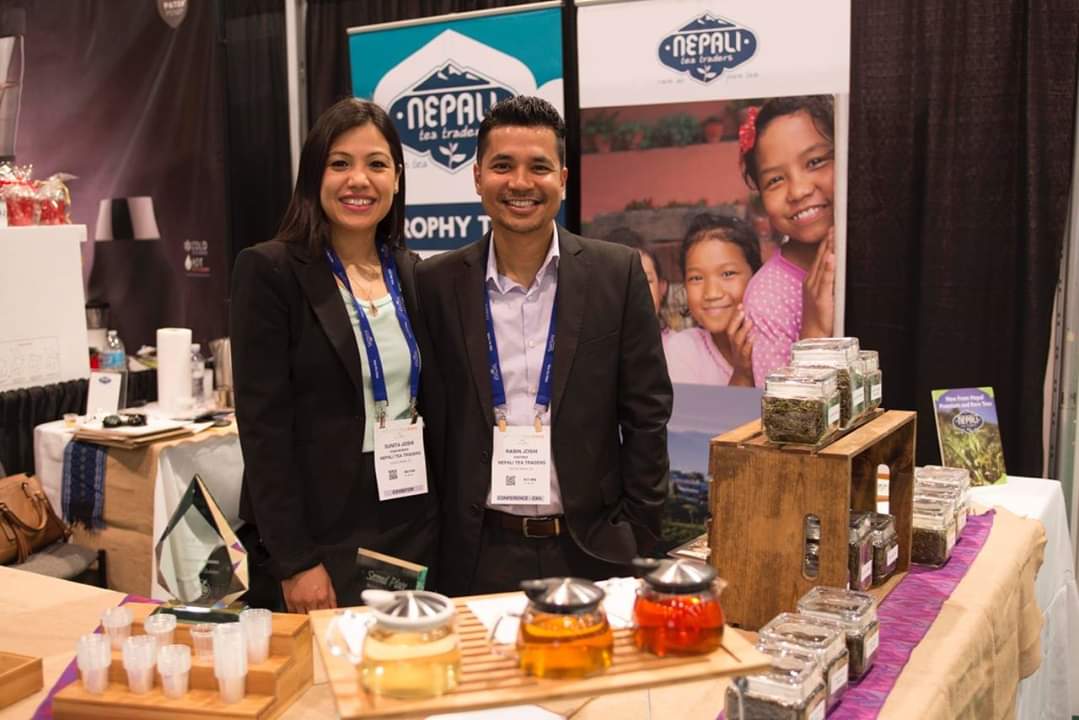
Tihar Celebration with Olgapuri, A Children’s Shelter in Nepal
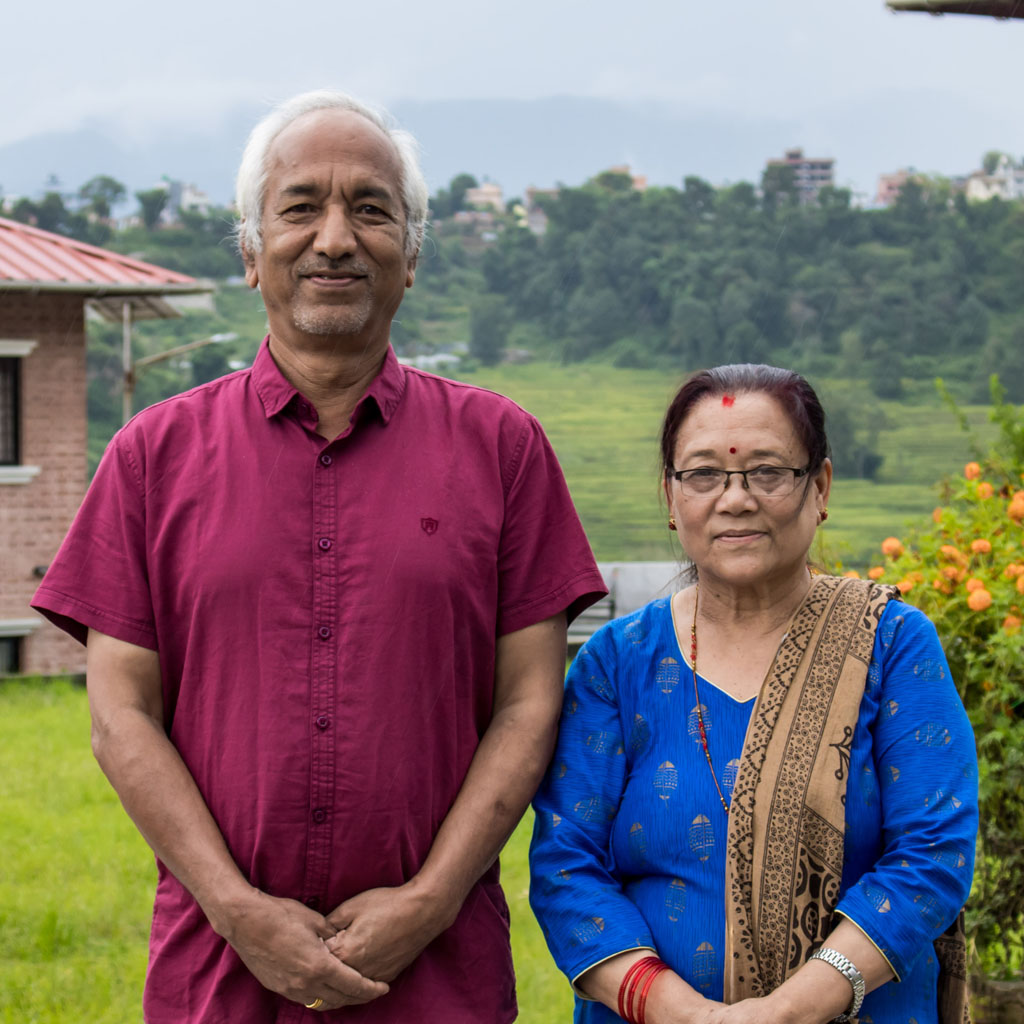
Tihar with Olgapuri House Parents Hem Prasad Shrestha & Binu Shrestha
Tihar, a Nepal celebration comes just one month after the festival of Dashain. Nepalese children love Tihar, especially because it offers special opportunities for siblings to honor one another!
Almost as soon as Olgapuri’s Dashain feasting ended, our four sets of loving house parents set to work planning a beautiful Tihar for the 80 children currently living on the locked-down campus. Tihar festivities began on November 13th and concluded on the 16th—to the enjoyment of all.
So far this year, we’ve spotlighted Dipak & Samana in the junior boys’ house, Bhim & Shreemaya in the senior girls’ house, and Bishnu & Pushpa in the junior girls’ house. As we share Olgapuri’s special Tihar celebration with you, we’re so pleased to introduce you to the fourth set of house parents: Hem & Binu Shrestha!
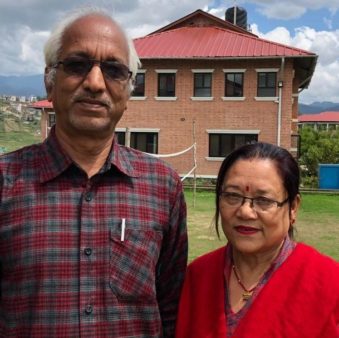
Hem and Binu are parenting the 20 senior boys living at Olgapuri Children’s Village. These boys range in age from about 13 to 18—a time of incredible growth, both physical and emotional, when long-term patterns are developed and critical lessons are learned in preparation for adulthood.
The married couple joined the Olgapuri Children’s Village team in March 2020, just as the campus was entering lockdown in response to the COVID-19 pandemic. Here, they are the newest team members, but they bring many years of valuable experience to the work they’re doing.
Hem-Uncle and Binu-Aunty have experienced incredible changes in Nepal during their lifetimes, including multiple dramatic shifts in government, the long Nepali Civil War, cultural shifts regarding caste and other minority rights, economic changes, and growth in areas like healthcare, education, and technology. Through it all, they have always prioritized the children around them. New generations will continue building their country towards the future. Love and opportunity ripple outward as children become adults.
They’ve already seen it happen. Hem has worked with NYF since 1996, both directly and indirectly. He even spent many years in leadership positions overseeing NYF’s growth on the ground. The two have worked in several children’s homes over the course of their careers, but they have always especially admired NYF’s loving, long-term, family-style approach.
Even as a very young man, Hem observed practices that made him wary of the way power can feed into corruption. Time and time again, he returned to NYF, because he knew that the resources went directly to the children being served. He recognized NYF’s deep, sincere commitment to each individual child’s wellbeing and long-term success. NYF staff members are truly focused on the children first, and it makes all the difference.
Hem and Binu are thrilled to bring their history in children’s homes to Olgapuri Children’s Village, where staff and children alike live together and cooperate like a large family. They have already earned the trust of the children in the senior boys’ house. Like the other house parents, Hem-Uncle and Binu-Aunty have spent the lockdown managing online classes for 20 students, organizing outdoor activities, and leading meal preparations. They also value the quieter moments, when the children come to them with concerns, troubles—and happiness as well.
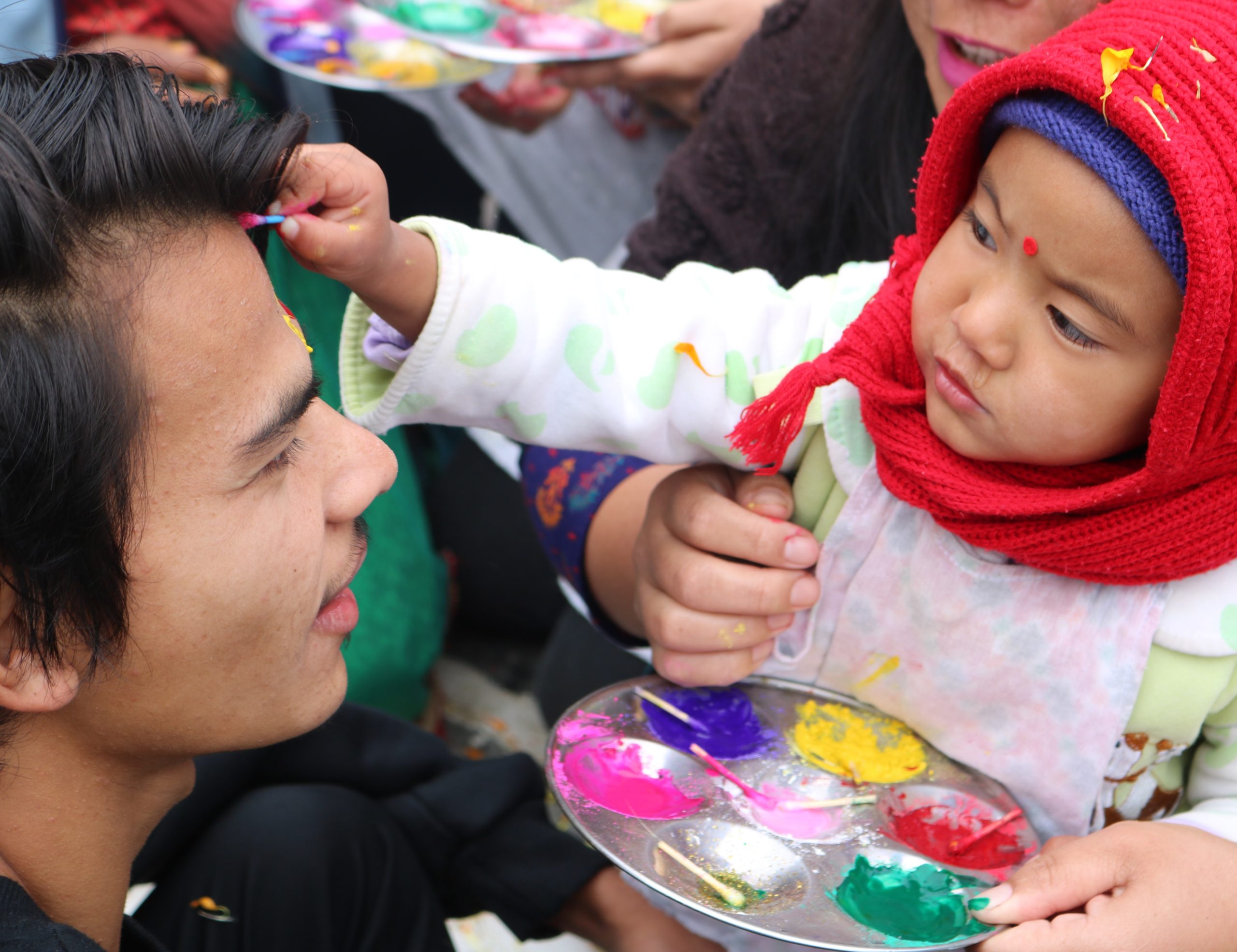
As these 20 boys quickly approach the beginning of adulthood, Hem and Binu are happy to share wisdom and guidance from their own lives. Each child at Olgapuri has a unique story, personality, and set of skills and struggles—like children everywhere. At NYF, we are so grateful to have wise and loving house parents like Hem and Binu to help each of these boys along their journeys of becoming.
And we are grateful for the ways all four sets of house parents ensure moments of celebration, even during lockdown conditions!
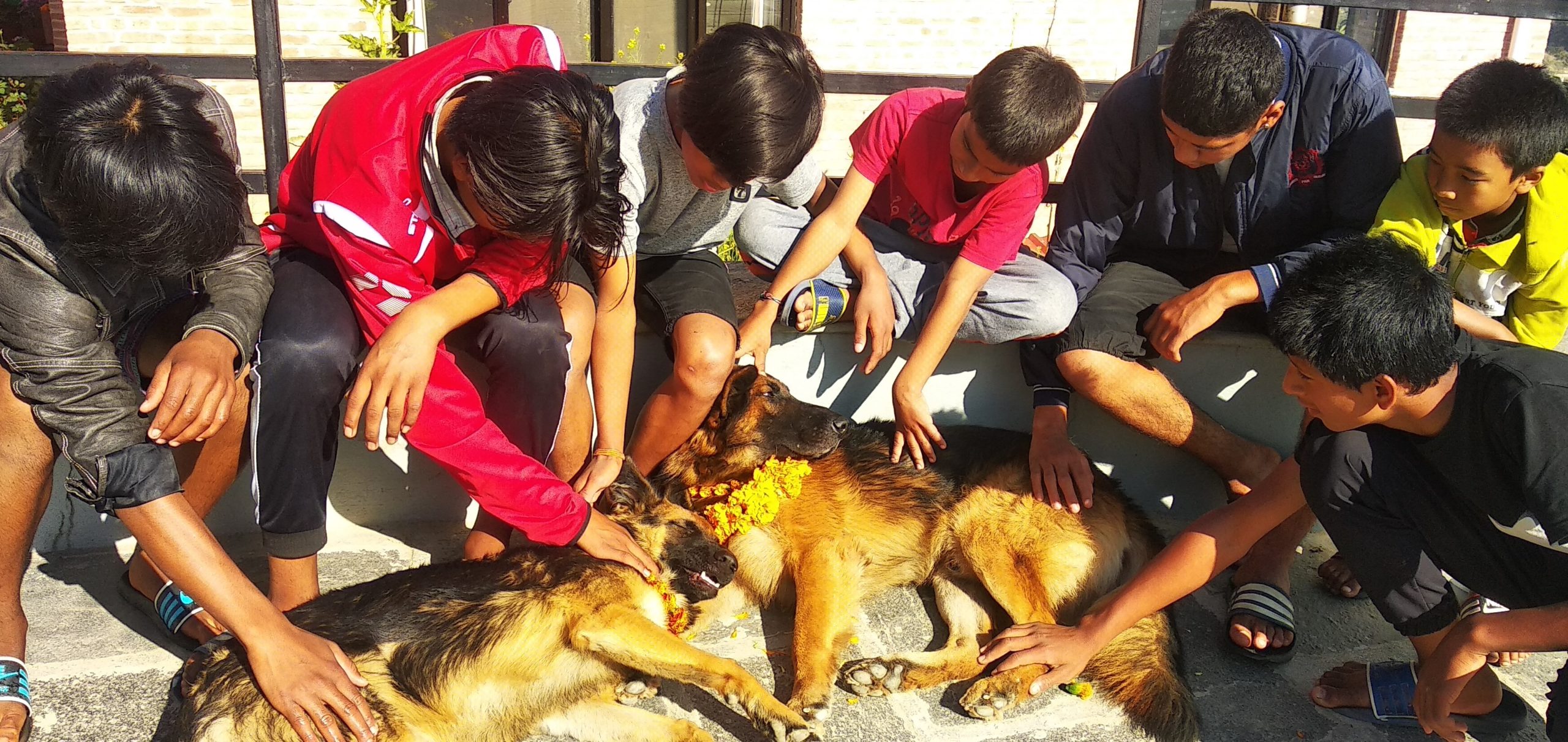
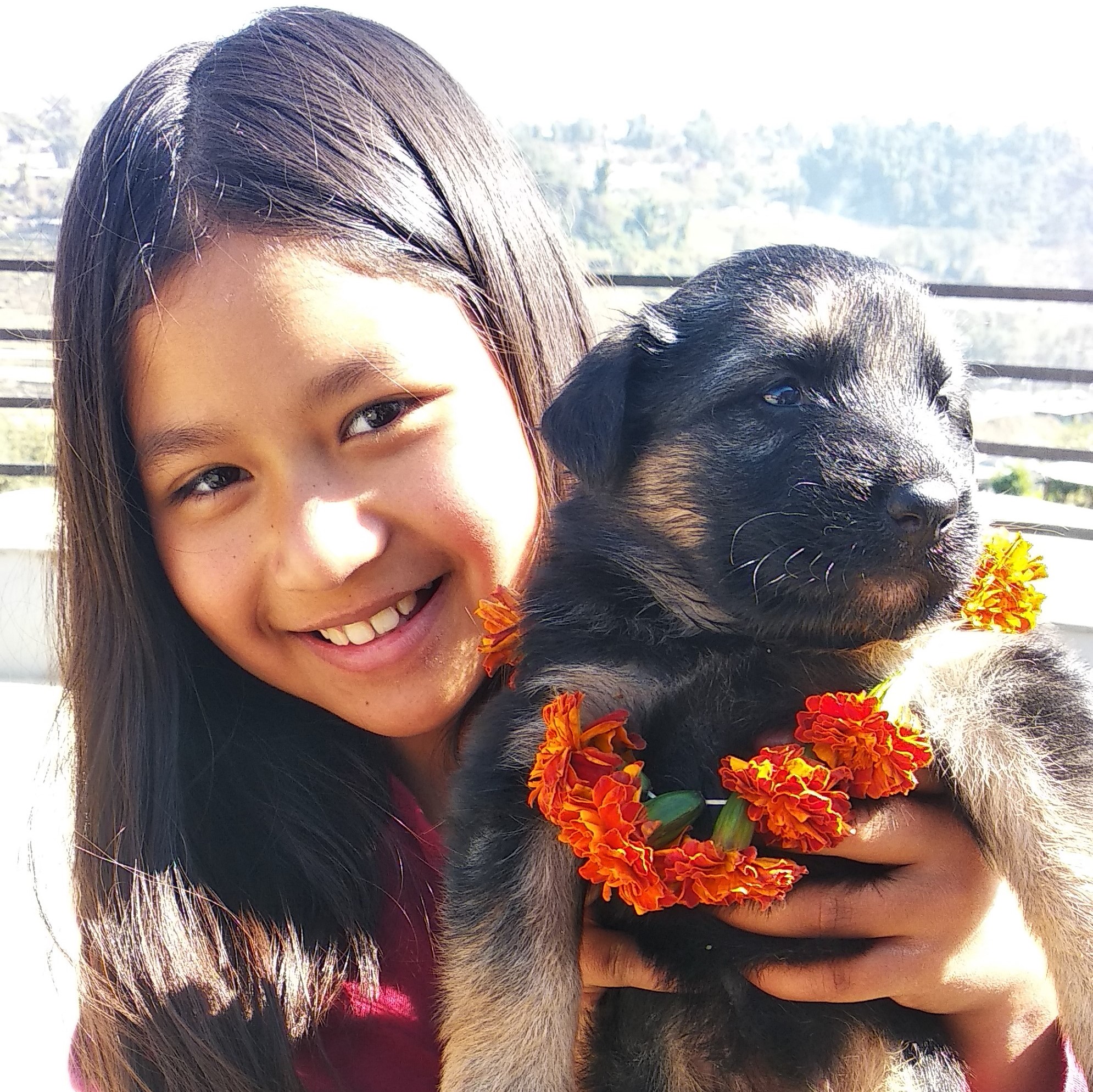
During the Tihar Festival, the children worked together with the house parents to prepare delicious Tihar treats, like selroti (a rice flour-based deep-fried sweet bread), anarasa (a deep-fried sweet pastry puff), arsa (a simple syrupy donut-like treat), and fini roti (a colorful, buttery, flaky sweet pastry).
They decorated each house with beautiful lights and flowers, representing wealth, happiness, and prosperity.
And throughout the holiday, the children played special Tihar games like tass (a card game) and langurburja (a dice game).
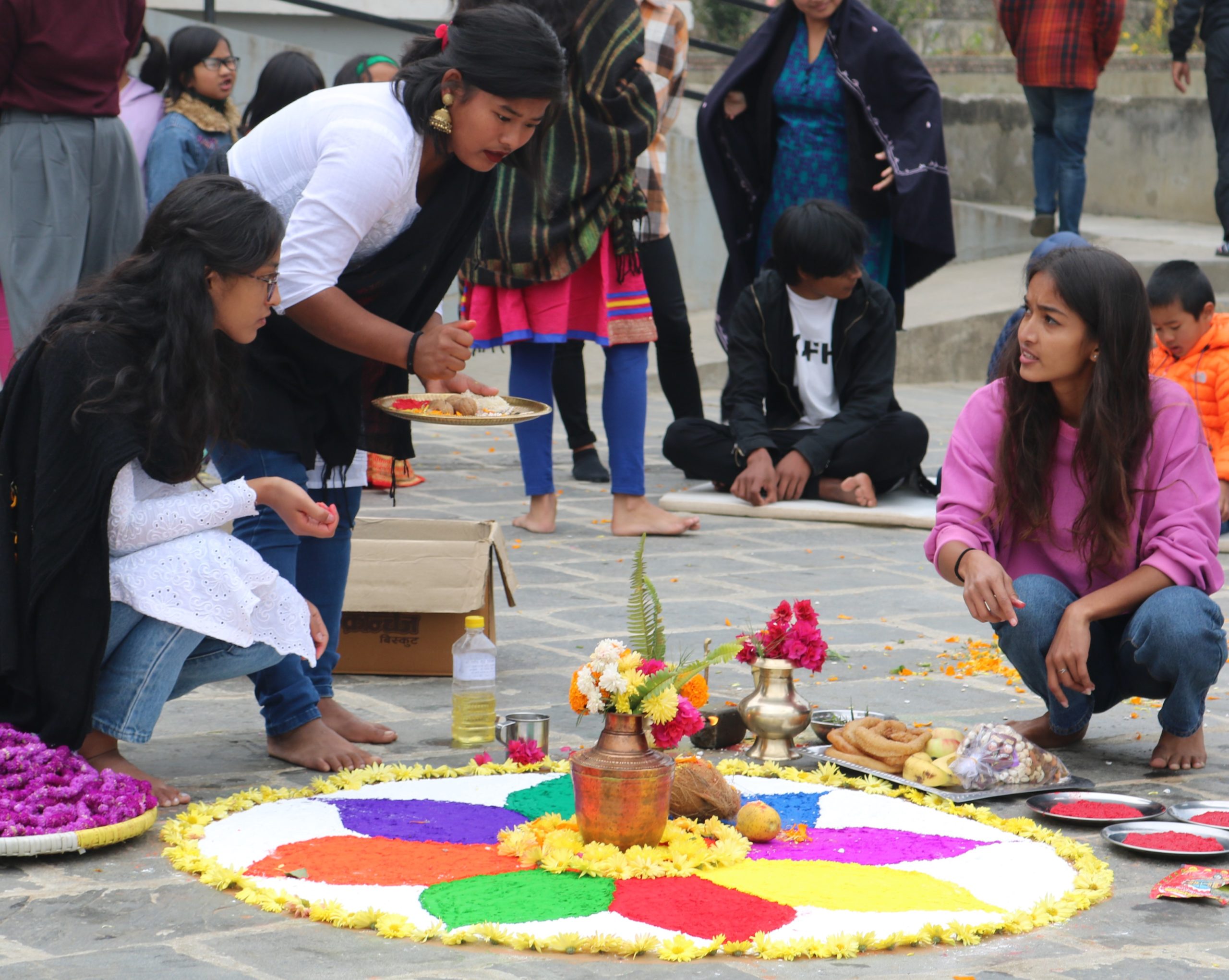
The fourth day of Tihar usually includes a celebration called Deusi-Bhailo, after traditional songs children and teenagers perform in their communities on this day. Similar to the trick-or-treating and caroling familiar to Americans, Deusi-Bhailo performers go door-to-door to people’s homes, singing and dancing and giving blessings for prosperity. In return, they collect money, sweets, and snacks.
To everyone’s disappointment, this tradition is not pandemic-proof. But at Olgapuri, the children and house parents created a virtual version of the event, streaming their performances to neighbors and friends in the Kathmandu Valley!
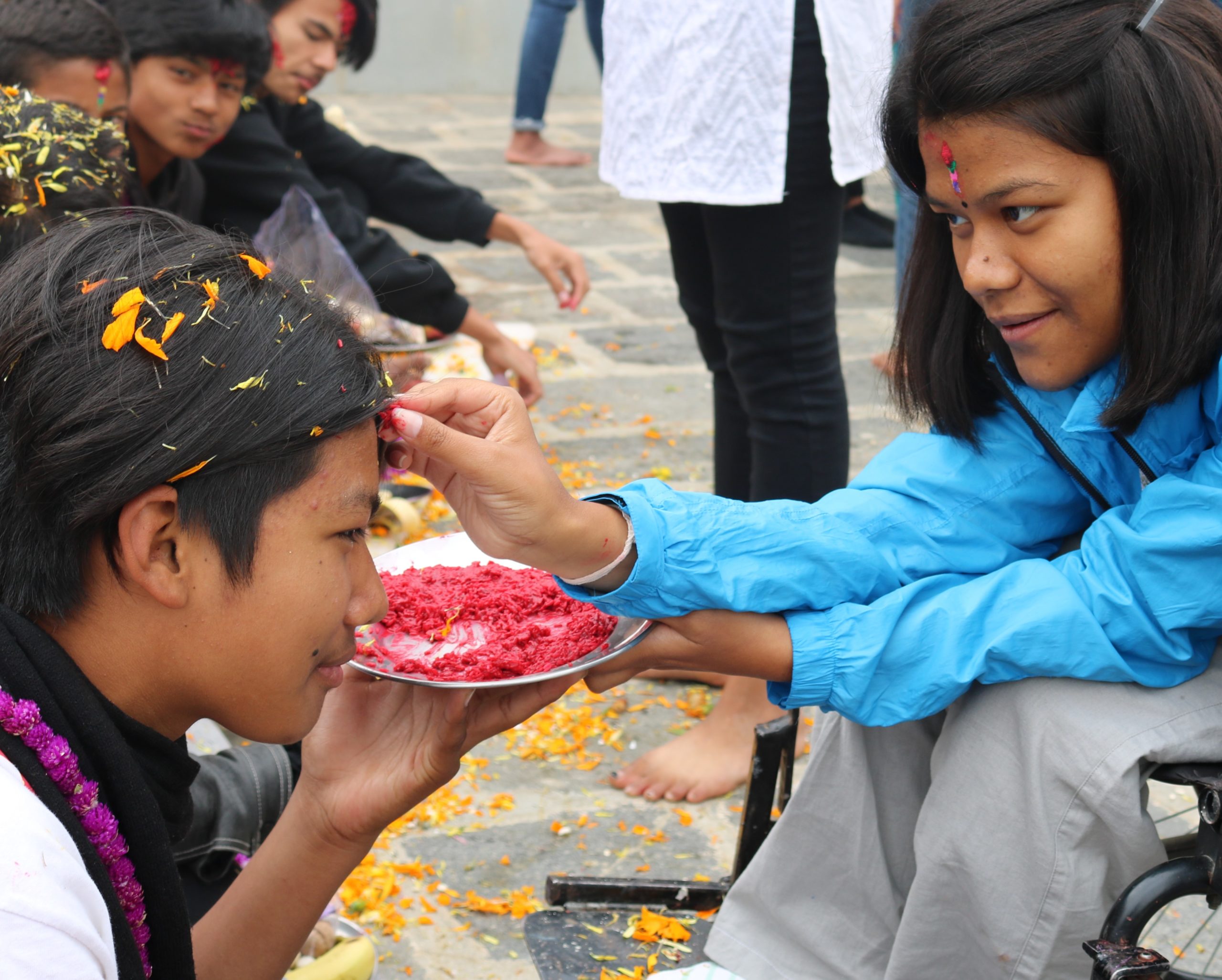
On the final day of Tihar, brothers and sisters show their appreciation for one another, placing special colorful tika on each other’s foreheads and exchanging small gifts and blessings.
Love and devotion between siblings is an important part of life at Olgapuri, where the family-style approach has always been the foundation of the work. In the 1990s, when Olga first started her work sheltering children at J House and K House, she recognized that the children she was serving needed stable family relationships as much as they needed housing security, healthcare, and educational opportunities.
All children need a sense of belonging. All children need to know that they are loved.
Hem-Uncle and Binu-Aunty believe in Olga’s vision of a children’s home that meets the emotional and cultural needs of its residents. So do the rest of the house parents at Olgapuri Children’s Village. Our house parents’ devotion to the children in NYF’s care is an incredible gift. Their loving attention—especially during the lockdown conditions they’ve been living under for the past nine months!—ensures that each child receives the healthiest, most nurturing personalized care NYF can offer.
Hem and Binu know that their #LoveWorks—and so does yours.
As households throughout the world prepare for a nontraditional, socially distanced holiday season in 2020, we’re all working hard to find ways to make meaning and build connection from the safety of home. If you believe in the work Hem and Binu are doing at Olgapuri, please help them by sharing their story on social media with the hashtag #LoveWorks!
Happy Thanksgiving from Olga!
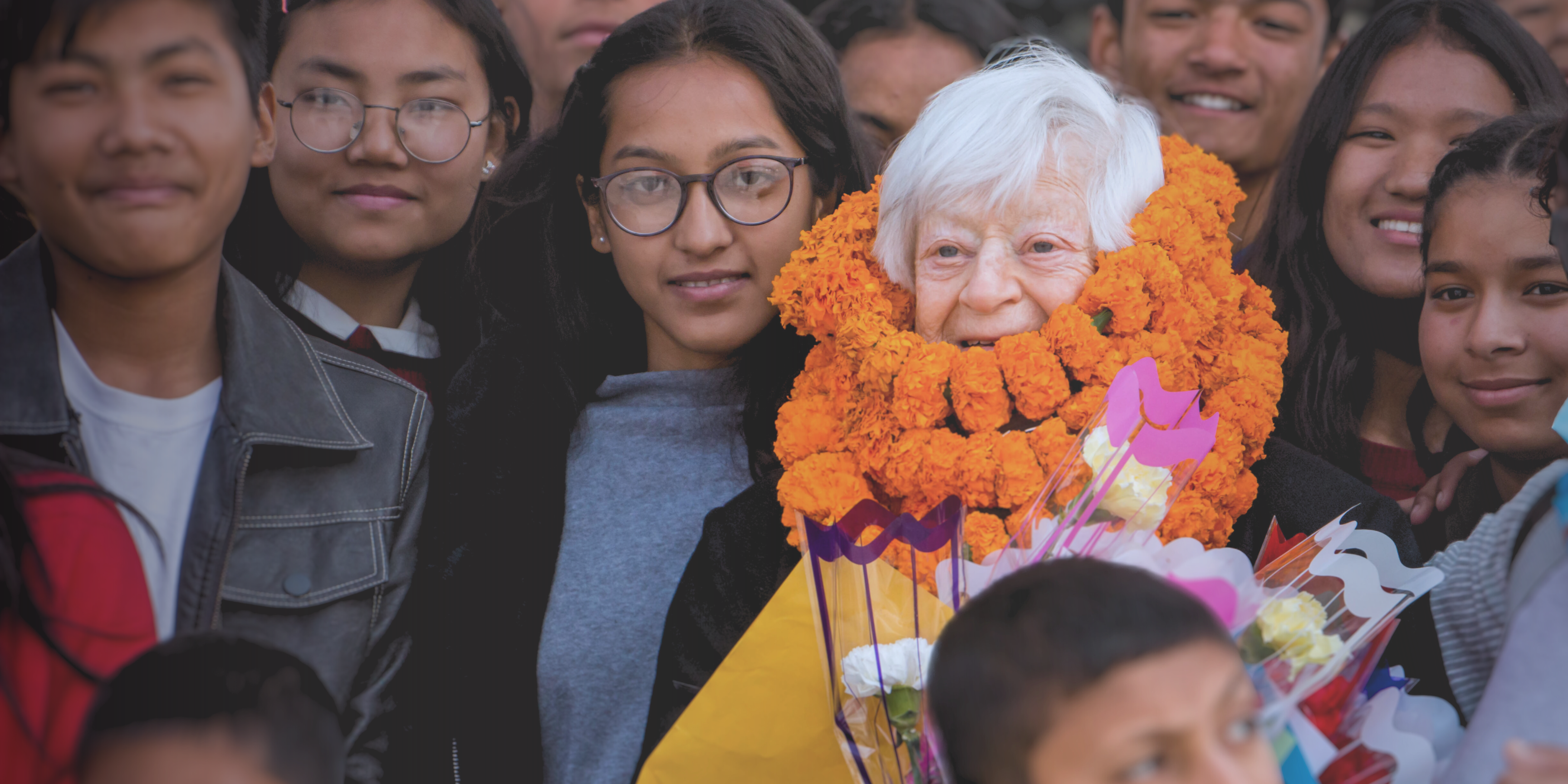
My dear friends,
Thanksgiving has always been my favorite holiday. I loved our family get-togethers and the prodigious feasts. But as the years have passed, it has taken on a whole new meaning. When you are in your 90s, every day is Thanksgiving. I am more conscious of all I have to be grateful for than ever in my life – my wonderful family, my good health, and the more than 35 years of joy and fulfillment I have enjoyed as a result of our work with the children of Nepal.
And, it’s a two-way street – if there was a Nobel Prize for expressions of gratitude, the children NYF has nurtured over the years would win, hands down.
Many of our children at Olgapuri come to us when they are very young, and it is not until they reach high school or college that they fully realize what a difference NYF has made in their lives. They often express their thanks with messages that are almost embarrassingly effusive. But whether they voice their thanks or not, our real satisfaction comes from knowing that these kids, who started life at the bottom of the barrel, are now well adjusted, solid citizens who will contribute to the progress of their country.
Until this pandemic year, I have spent the past decades in Nepal during Thanksgiving.
In Nepal, the Nepalis do not celebrate the holiday, but the American community tries. In years past, the only way I could get my hands on a turkey was to ask someone coming from the US around Thanksgiving to bring a frozen bird on dry ice. This would result in hilarious exchanges at Nepalese customs, whose employees kept asking why the traveler was bringing a big, dead bird to Nepal. Over the years, the task has become easier. These days, you can get not only the turkey, but cranberry sauce locally.
This year, a socially-distanced Thanksgiving will once again make the holiday a new experience.
I certainly do miss celebrating Thanksgiving with my Nepalese friends. But, the spirit of gratitude always remains.
Friends, I am so grateful for you, and for the generosity and love you have shared with the children in NYF’s care. Dhanyabad! Thank you for your time, your talents, your treasure, your notes of encouragement and support, and your confidence in recommending us to your friends. Thank you for your attention to Nepal’s children during this extremely tumultuous year. Thank you for your grace with our team during these months of tremendous change.
Your remarkable love is the reason we call our supporters “The NYF Family.” This year, more than ever, you have lived up to the moniker.
You are the reason #LoveWorks.
Thank you, thank you, thank you all! With love and wishes for a happy and a safe Thanksgiving,
Olga Murray
Founder & Honorary President
Help rekindle hope in the human condition this Thanksgiving
NYF’s Ongoing COVID Response: We’ve Launched 50 Access to Education Centers!
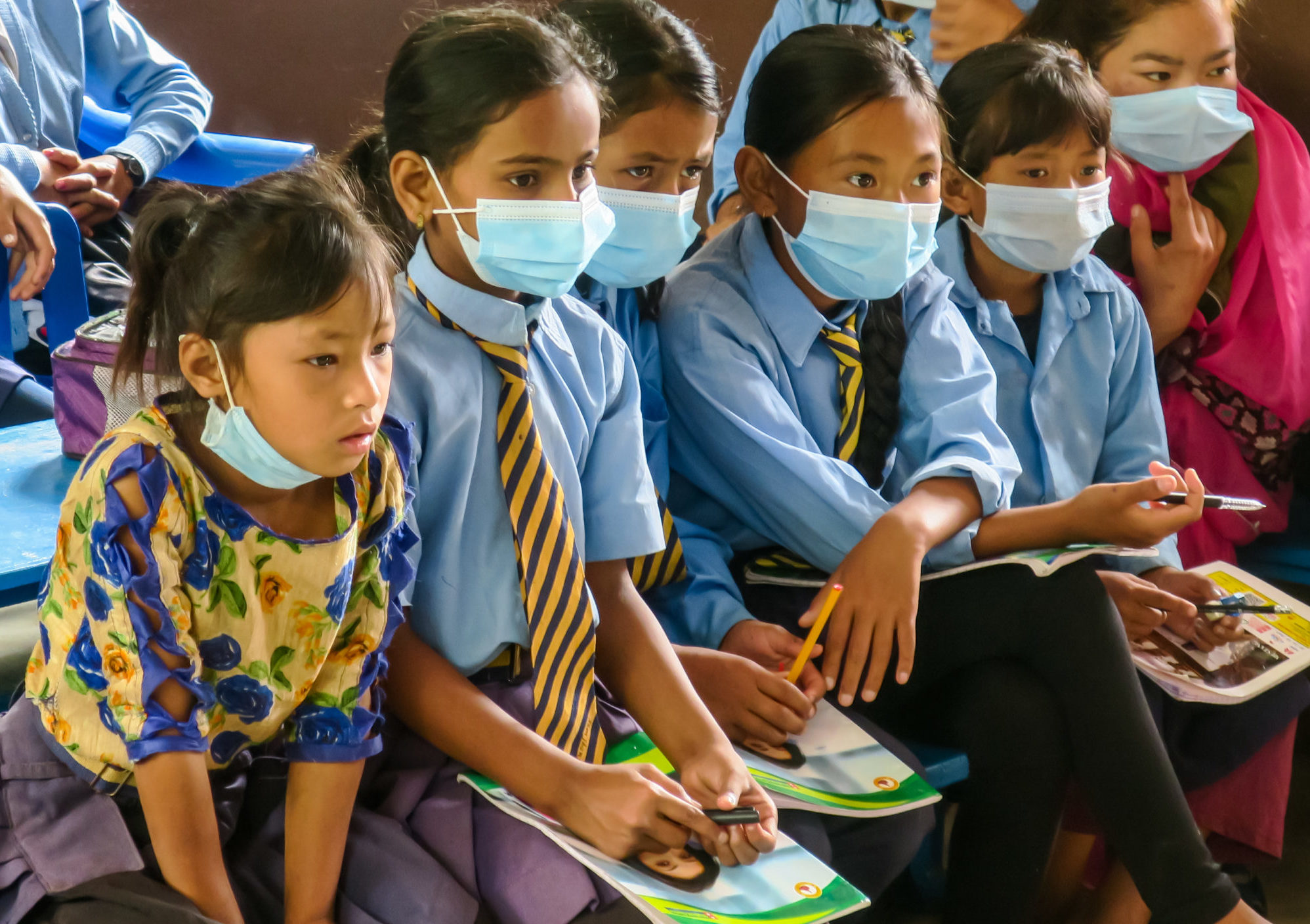
Access to Education is officially NYF’s largest COVID response program yet!
An Update from NYF President Som Paneru
Dear Friends,
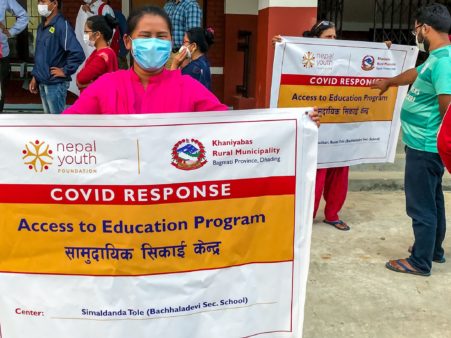
When we piloted the Access to Education program in August, with only four satellite learning centers, we knew we would need to move quickly to keep students in rural Nepal from falling too far behind their peers in digitally-connected regions.
I am proud to announce that as of early October 2020, an additional 46 Access to Education Centers have been established in two rural municipalities in Dhading District: Netrawati Dabjong and Khaniyabas!
With an average of 100 students per satellite center, we’re currently providing 5,000 K-10 students with educational opportunities they haven’t had in six months! Partnering with public schools, this program is also mobilizing 354 teachers who are already on the Nepalese government’s payroll.
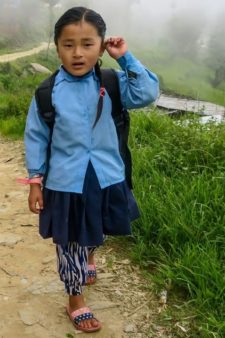
Materials provided for each satellite center include a laptop preloaded with teaching materials linked to Nepal’s country-wide curriculum for each grade, a widescreen television, teacher training sessions, a white board, and reference books.
Classes are held in a building large enough for the village’s children: a women’s group meeting hall, a local health post, even an empty cow shed, if necessary.
And the Access to Education Centers with satellite are quick to establish. The materials provided to the teachers match their regular curriculum. Technical training is provided by NYF when materials are distributed. Once a teacher has returned to their village, they can begin teaching right away.
We hope to continue scaling Access to Education throughout the pandemic. We’re already working on expanding into Gorkha District’s Gandaki Rural Municipality.
Shankar Gurung, a teacher, tells us, “The students are excited to come. The resources provided by NYF have been so helpful and the students are enjoying learning from this new technique.”
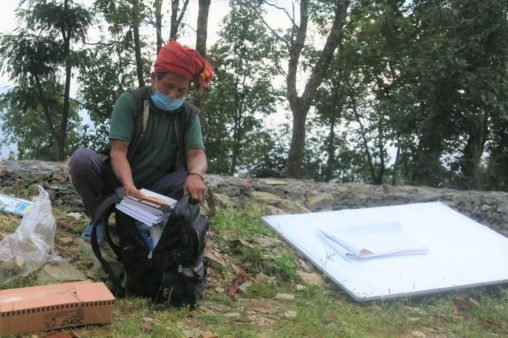
The teachers are excited, too. Nepal’s rural schools haven’t yet gained access to digital technology—until now. As we trained the latest batch of teachers, we met many, like Ram*, right, who had never worked with a computer before. He was delighted to see the familiar curriculum appear on the screen during his training and was relieved to learn how user-friendly the device was. NYF has assured him that we’re only a phone call away if he needs any troubleshooting support.
Packing his new materials up, porter-style, Ram told us he’d traveled two hours on foot from his village to meet us at the school building—the same walk his students used to take every day.
He is thrilled to have a way to get back into the classroom, bringing critical opportunities back into the lives of students he has dedicated his career to educating.
As a former teacher myself, I understand his excitement. Having the resources to bring good-quality education to your community is a precious thing. Knowing the children in your care can keep learning, even during a pandemic, is an incredible relief. It’s something none of these teachers take for granted.
Many of the villages we are serving are very remote—days away from the nearest towns on foot. Even in the best of times, children experiencing poverty drop out of school to contribute to their family expenses through cheap labor, and instances of early marriage are very common for young girls especially.
These learning centers have been critical in helping keep these children in school and minimizing dropouts.
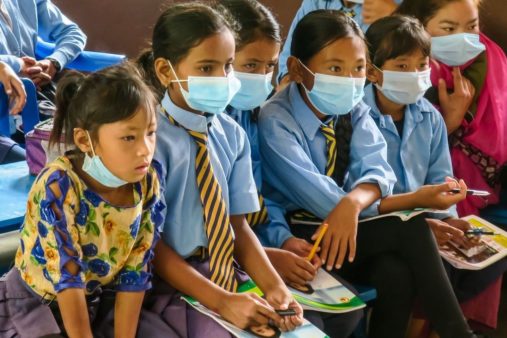
Thank you to each member of the NYF Family who has lovingly supported Access to Education so far!
As COVID-19 continues to surge in Kathmandu Valley, we are uncertain how long school closures will last.
Fortunately, the travel restrictions have protected many of these more rural communities. Children from within a single village must still wear masks, just in case, but among members of their own remote community, they have very limited opportunities for exposure to COVID-19.
We’ve built momentum with this incredible program, and we’re hoping to grow as much as we can in the coming months.
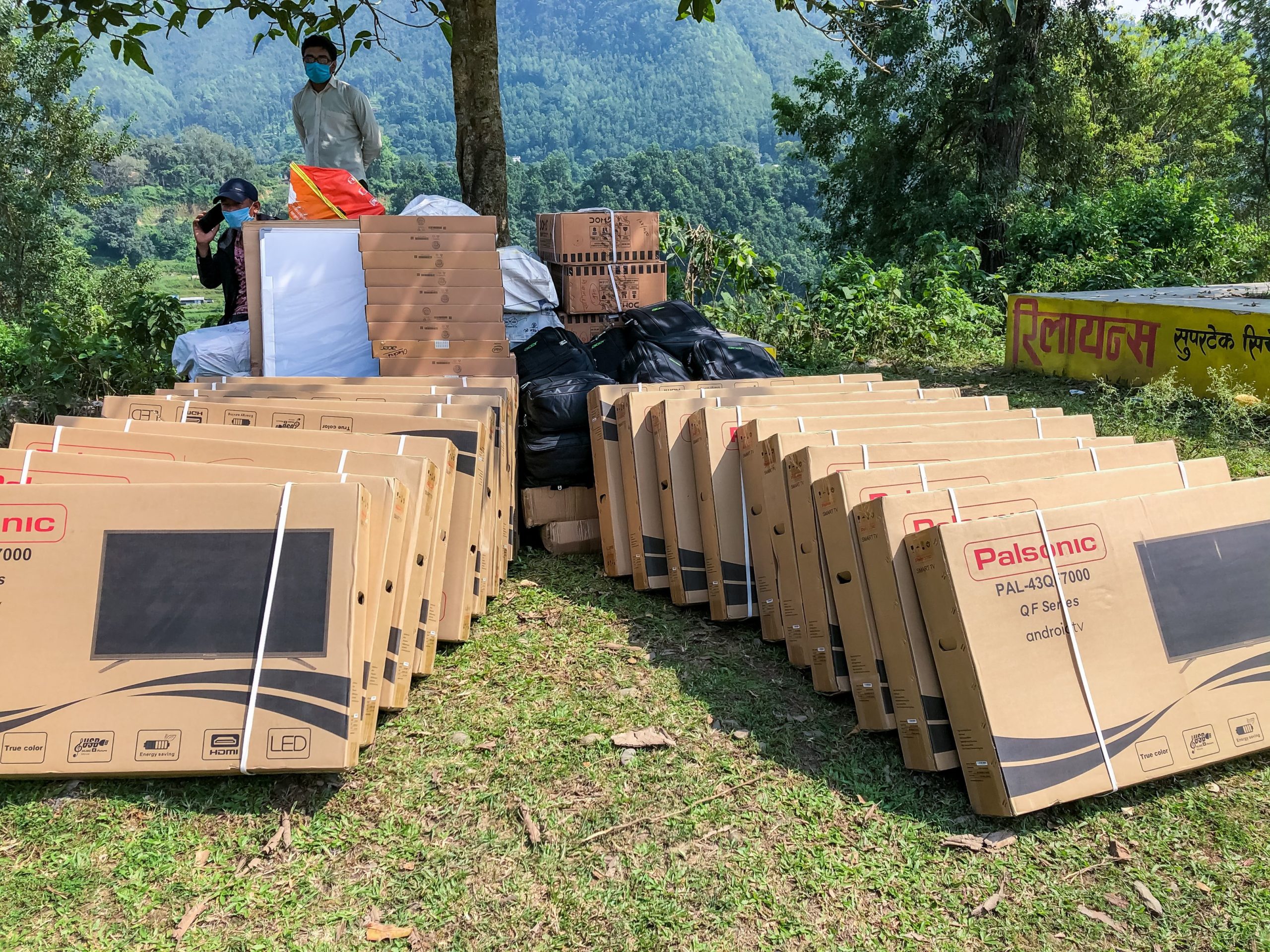
Each learning center in our Access to Education program costs $1,000 to establish and can serve 100 students or more. Please help us provide these vital opportunities to children in rural Nepal by making your loving donation here.
Dhanyabad,
Som Paneru, President
*Names have been changed to protect privacy
Credit card donations via our website are still being processed without delay, as are direct bank transfers (EFTs). If you mail a check to our office (1016 Lincoln Blvd #222, San Francisco, CA 94129) please know that we continue to check the mail twice per week, so there will be a delay in our thank you letter being mailed to you.
If you need to reach us, staff are monitoring individual emails and the email address Info@NepalYouthFoundation.org daily. You can also call us at 415-331-8585 and leave a message, as staff will be periodically be calling in to check voicemail.
Dashain 2020 in Nepal – Preparations for Celebration
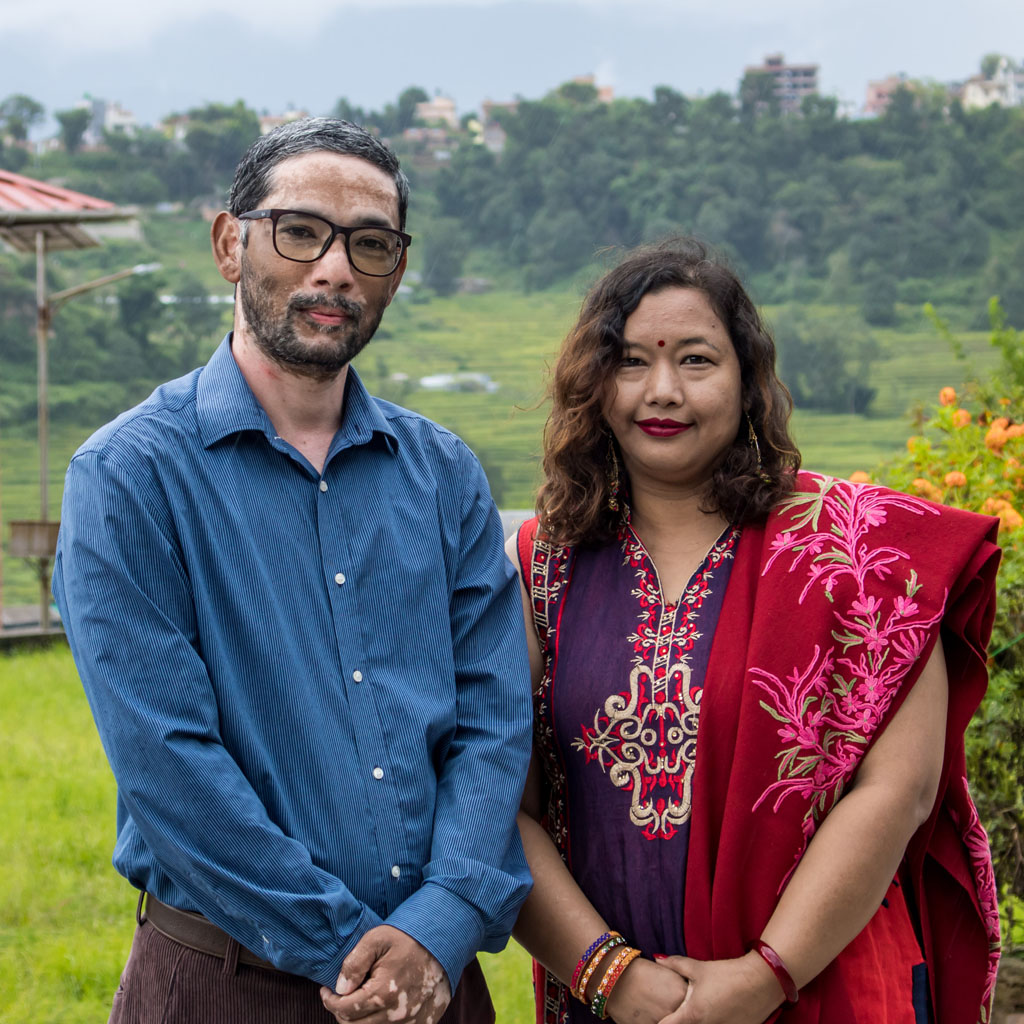
Dashain in Nepal is the longest and most beloved festival. First comes monsoon season—heat, high humidity, heavy dark afternoon clouds, torrential rain, lush green landscapes, deep puddles, long thick grass, and the ever-present scent of soaked soil. All this rain between June and September floods the country’s prepared fields, ensuring a rich harvest later in the year.
Nepali celebrate Dashain in the fall. This is the longest Hindu festival in Nepal, traditionally celebrated for two weeks with prayers and offerings to Durga, the Universal Mother Goddess. The great harvest festival of Nepal, Dashain is a time for family reunions, exchange of gifts and blessings, and elaborate pujas.
On the Olgapuri campus, high-energy husband-and-wife duo Dipak Raj Onta and Samana Amatya Onta knew when the monsoon rains started that they’d need to get extra creative to keep their 20 boys entertained this summer.
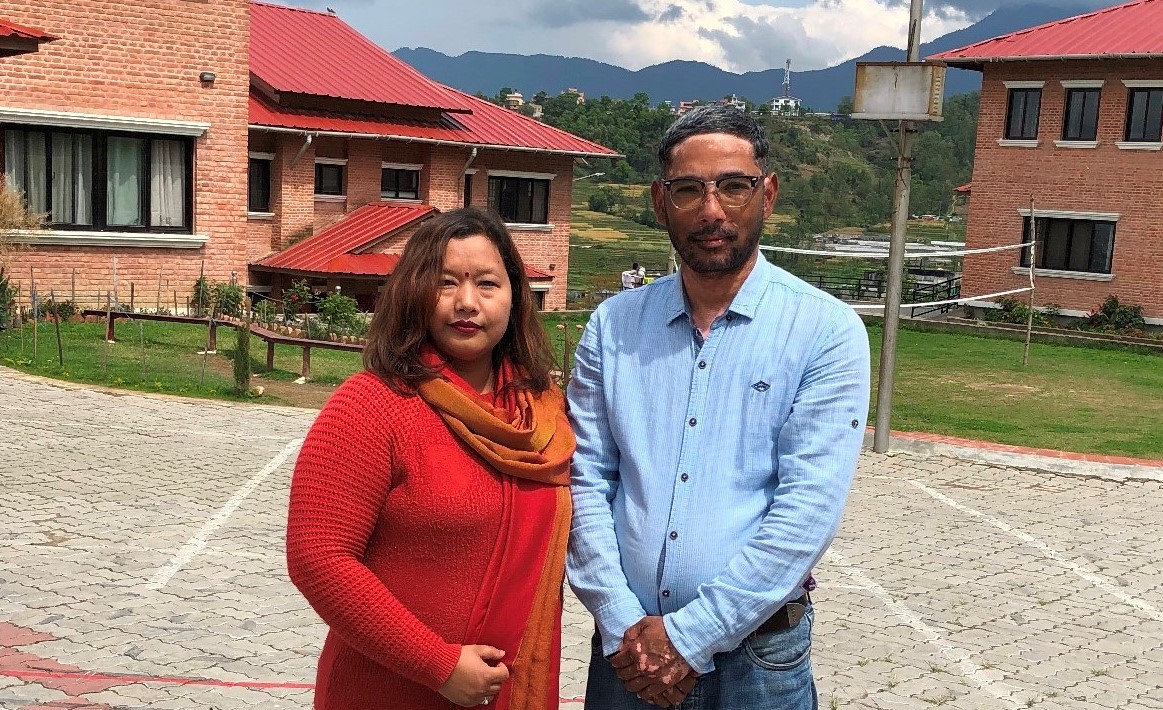
All summer long they’ve helped organize outdoor activities—the kind of rowdy “big body play” that is so critical to children’s brain development, physical health, self-confidence, social growth, and academic success. Whenever they can, the two make sure to join in the fun themselves. They’re enjoying the extra togetherness with the kids this year.
The 20 kids in the junior boys’ house range in age from 4 to 13, and so, like Bishnu and Pushpa in the junior girls’ house, Dipak and Samana are managing online classes and helping with homework for multiple grades at once. They’re also teaching the boys age-appropriate cooking and basic life skills, like Bhim and Shreemaya in the senior girls’ house.
And this month, all four sets of house parents joined forces to help the kids celebrate a very strange Dashain 2020.
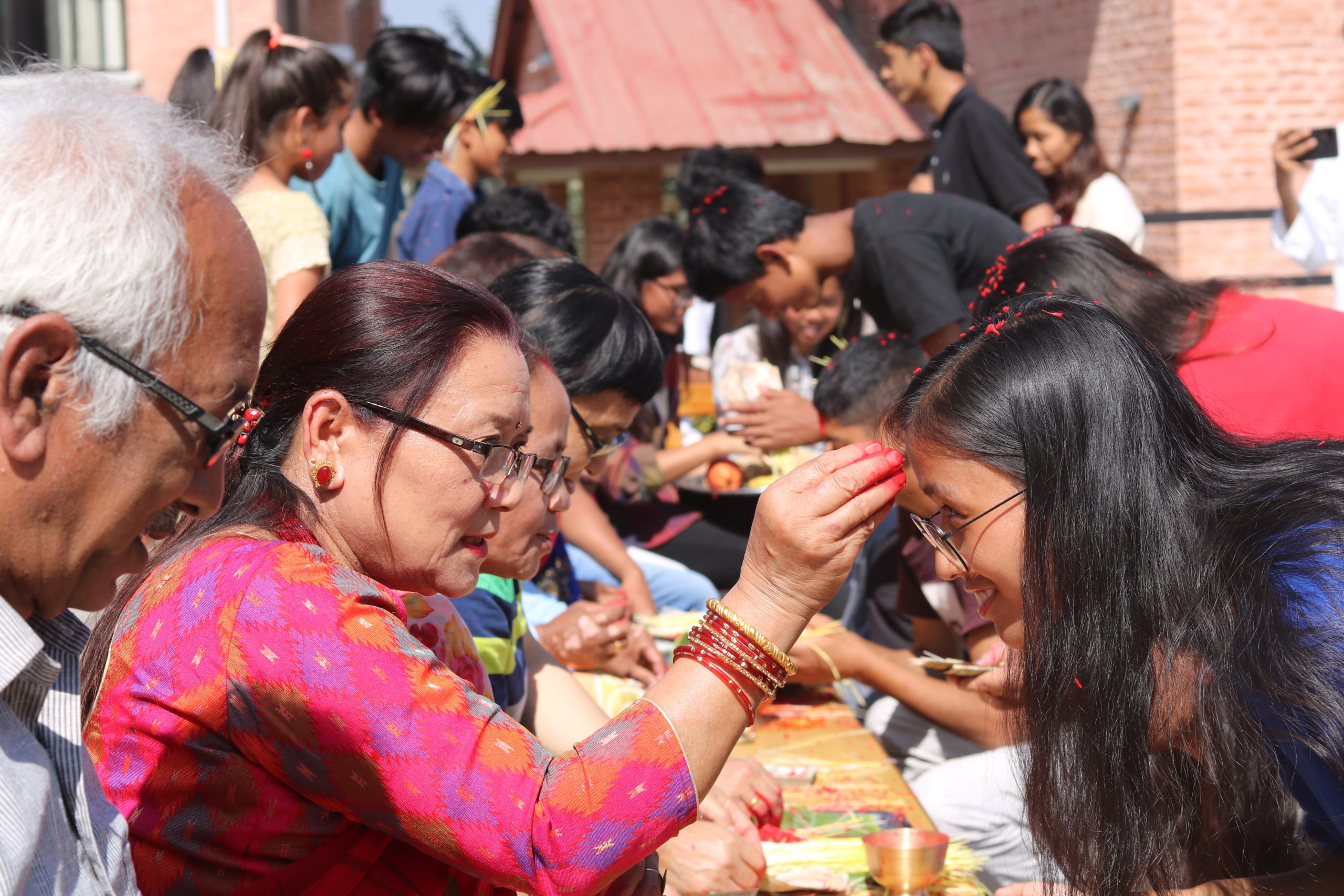
Dashain (pronounced de-SAI) is a 15-day-long lunar festival that usually occurs in September or October. It’s one of the most emotional, colorful, and enjoyable times in Nepal. The holiday blends harvest-time and fertility with the triumph of good over evil, and family members travel from far and wide to celebrate together.
The festival’s Hindu roots don’t keep members of other religions from participating. Everyone enjoys the opportunity to feast with family, exchange gifts (especially new clothes), and trade memories. Elders bless the children. Children play together. Warm feelings fill everyone with joy.
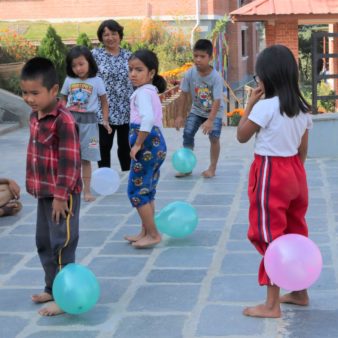
Throughout the world this year, families are working to think of creative ways to celebrate each culture’s special moments without risking illness. Nepal is no different. With most travel out of the question, many Nepalese families will be spending a very lonely Dashain—or at least a strangely quiet one.
Many of the children at Olgapuri return to their home villages for Dashain, where they can connect with their region’s unique culture. Some still have extended family members who love maintaining a relationship with them, even though they’re unable to provide a stable home. NYF encourages these healthy relationships, allowing each child to bond with their world beyond Olgapuri’s walls.
But this year, none of the children can travel anywhere. Luckily, Olgapuri is a loving family all its own. Our four sets of house parents, including Dipak and Samana, were determined to give the children the best pandemic-era Dashain they could!
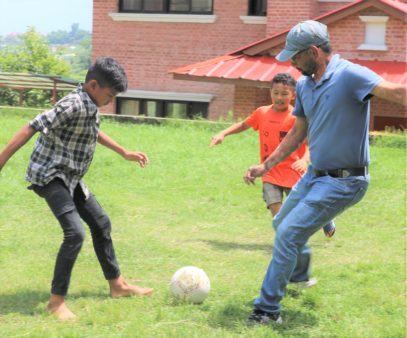
Dipak joined the NYF team in 2015, managing a transit home NYF established in Gorkha District for children displaced by earthquakes. Soon, he was also managing NYF’s earthquake scholarship program in the district as well. Managing the transit home was a great fit for Dipak—he loved caring for the children and using the power of play to make their lives feel a little more normal and safe after so much trauma.
In January 2018, Dipak and Samana became the junior boys’ house parents, where they’ve been able to continue this work long-term. Samana was thrilled to join her husband here. She’s always loved working with children and didn’t have much opportunity to do so in her work as a fashion designer. They are each inspired by Olga’s life story and by her commitment to Nepalese children, and they are proud to be part of the work being done by NYF.
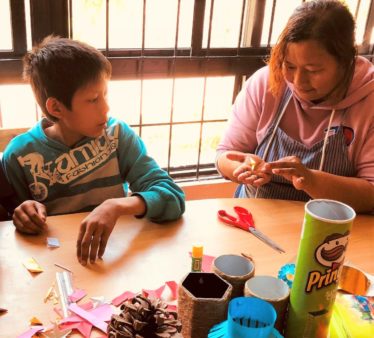
Dipak-Uncle and Samana-Aunty are social and optimistic people, and they love the Olgapuri community—visiting with the other house parents, interacting with the 80 children, chatting with the wide array of staff members. Olgapuri feels like being home with a large family.
Though the element of work is always there, Dipak and Samana feel less like they’re doing a job, and more like they’re simply raising their own children in a warm, supportive environment.
That’s never been truer than right now, during Nepal’s most family-centric festival. The house parents managed quite a schedule this year, including an ongoing carnival on the grounds (including sports competitions and more), traditional Dashain card games, feasting, and a special Dashain swing called the linge ping!
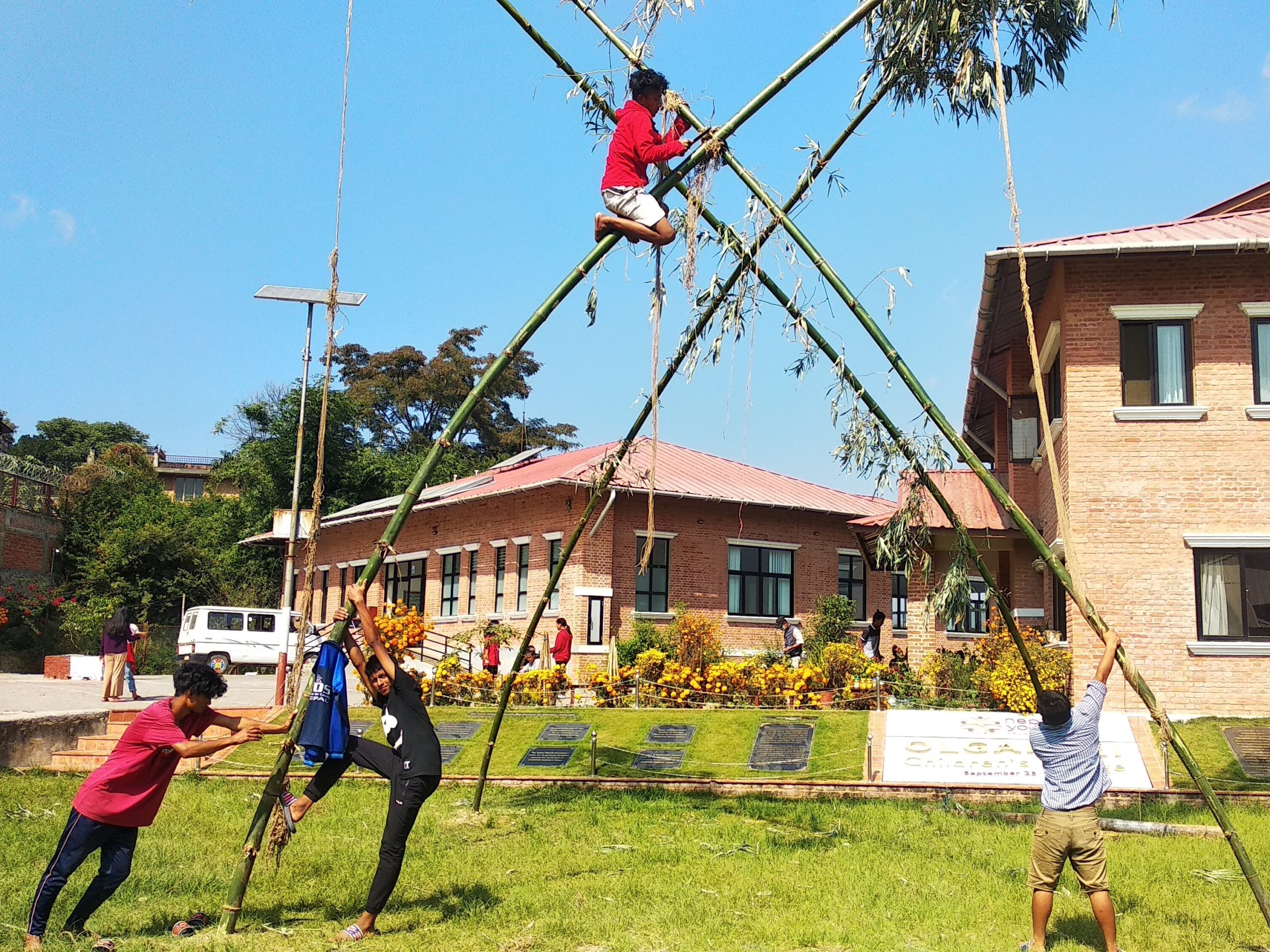
Dipak and Samana’s 20 junior boys were most excited about the food, the games, the swing, and the presents—just like kids everywhere! They especially love the tika ceremony, in which the elders bless the children by placing a bright red paste on each of their foreheads. It’s a ritual of love and belonging—one our house parents was honored to participate in this practice in celebration of Dashain 2020.
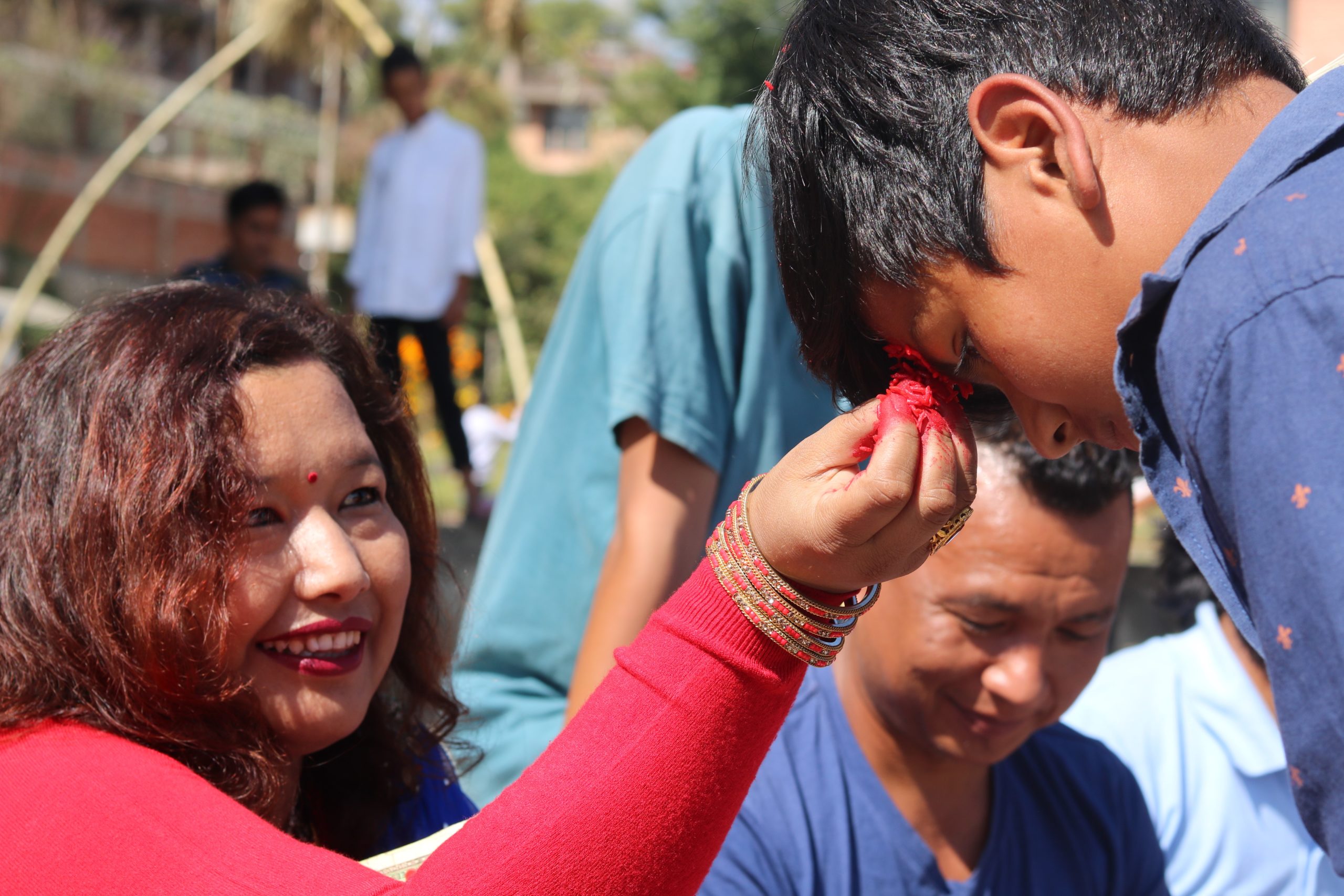
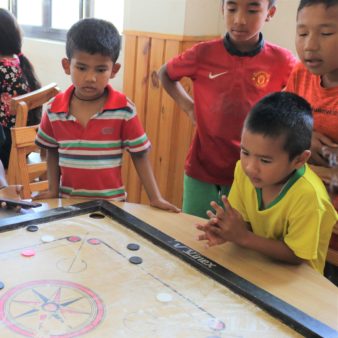
Though many of the children missed traveling, they enjoyed Dashain 2020 with their Olgapuri family. Dipak and Samana feel the same way. As they celebrate with the 20 boys in their care, they’re happy to be part of this important work. They cherish the ways each child shows their kindness, helpfulness, creativity, and athleticism.
They love cycling with the children, and playing basketball, soccer, tag, hide-and-seek, and more. On rainy days, Samana enjoys opportunities to show the boys arts and craft techniques while others play board games nearby.
NYF is lucky to have them on our team! Running around with 20 young boys, Dipak and Samana are glad to be part of the reason #LoveWorks.
Throughout the world, families are preparing to celebrate major holidays a little differently this year—and Olgapuri is no different! If you believe in the work Dipak and Samana are doing, please help them by donating here or by sharing their story on social media with the hashtag #LoveWorks!
Former Kamlari Girls, Now Fight COVID-19 in Nepal
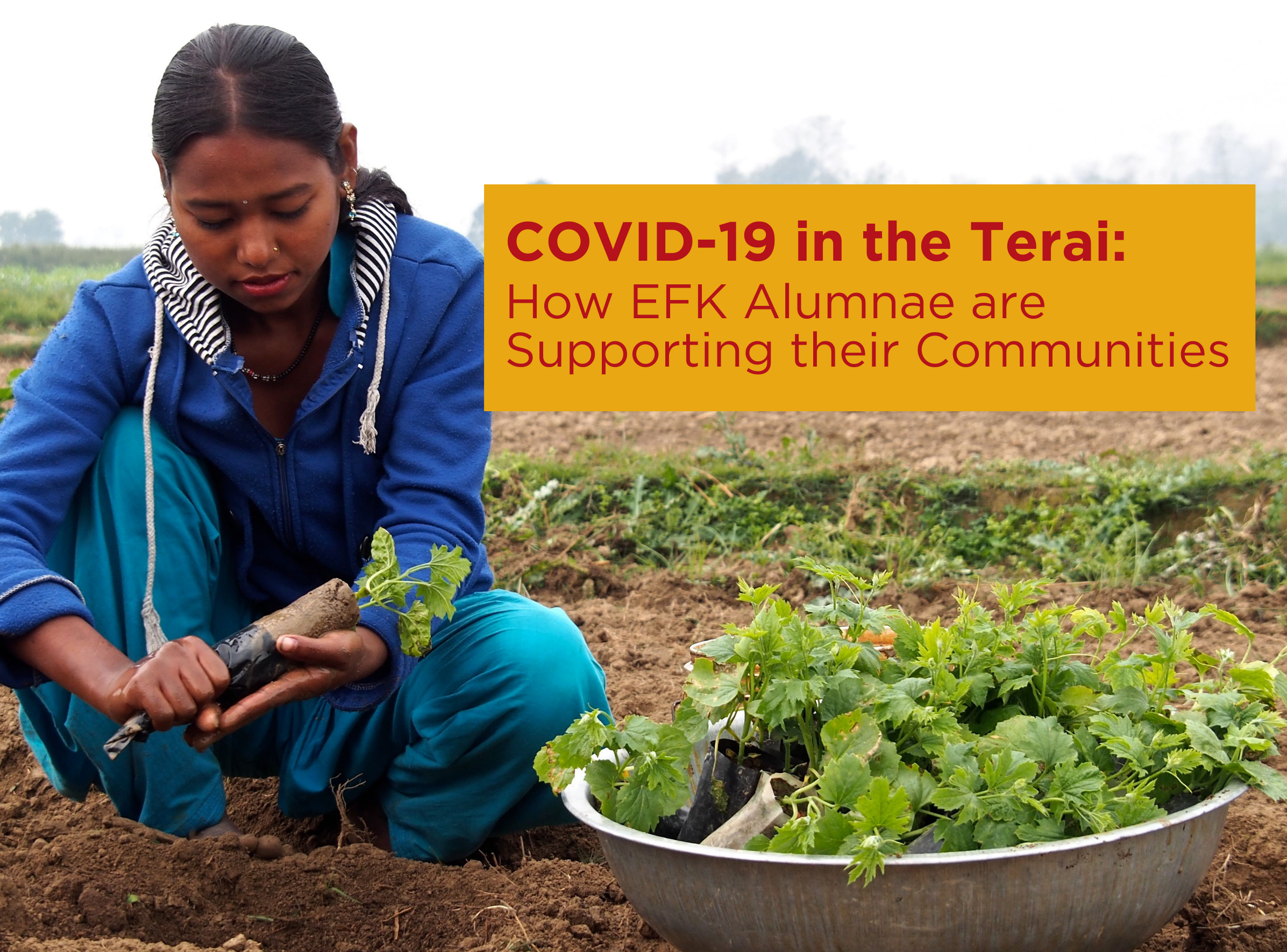
Former Kamlari girls and women help fight Covid-19 in Nepal. NYF is so proud these women are helping with this international crisis.
During COVID-19, in the Freed Kamlari Development Forum’s first months of independence from Nepal Youth Foundation (NYF), the Tharu community in western Nepal has faced new challenges. Because all Tharu communities live along the Nepal-India border, many young Tharu people support their families through work in Indian agricultural or factory jobs. When the pandemic began, these young people were sent away without work, and those without their own farmland have been unable to provide for themselves in the months since. Many small business owners in the region have had to shutter their stalls and workshops to comply with social distancing requirements. The economic impacts of ongoing border closures and travel restrictions threaten to harm the health and education of each family.
Fortunately, with their home-grown NGO established in the area, these communities have been surviving the pandemic together.
Early in the lockdown, the FKDF and our Ankur Counseling Center coordinated to mobilize the trained peer counselors within the Freed Kamlari community. These women were able to reach out by phone to individuals in their villages, providing emotional support and problem-solving guidance wherever possible.

Through their 47 locally operated co-ops, savings groups, and self-help groups, the FKDF has also been able to provide emergency financial relief to families. Twenty years ago, the kamlari practice seemed like the only way for families to pay back the predatory debts accrued in times like these, and sky-high interest rates made those debts nearly impossible to overcome. Agricultural co-ops and financial savings groups run by the community ensure such a thing can never happen again. Now, the Tharu people can provide each other with timely support and manageable interest rates designed to promote financial success in their communities.
Finally, the FKDF is leveraging its strong network of local government partnerships. Due to the incredible work they have already done, and to their connection with NYF, the FKDF is able to coordinate with local- and district-level government bodies to run community awareness programs against COVID-19. They’re hard at work keeping their families, villages, and futures safe.
That’s a special kind of freedom.
NYF is so proud of the work these women are doing during this international crisis. We are proud of the confident and capable leaders they have become. Thank you to each and every one of the NYF supporters who have invested in these incredible women over the past 20 years! Your loving gifts—whether funding piglets in the early days, sponsoring individual educational goals, contributing start-up funds for one of the locally-led co-ops, providing vocational training to hard-working entrepreneurs, or spreading the word within your own communities—have given these communities the ability to meet an unprecedented crisis with amazing resilience.
Dhanyabad! Thank you for your belief in the worth of these girls. The FKDF is proof that your #LoveWorks.
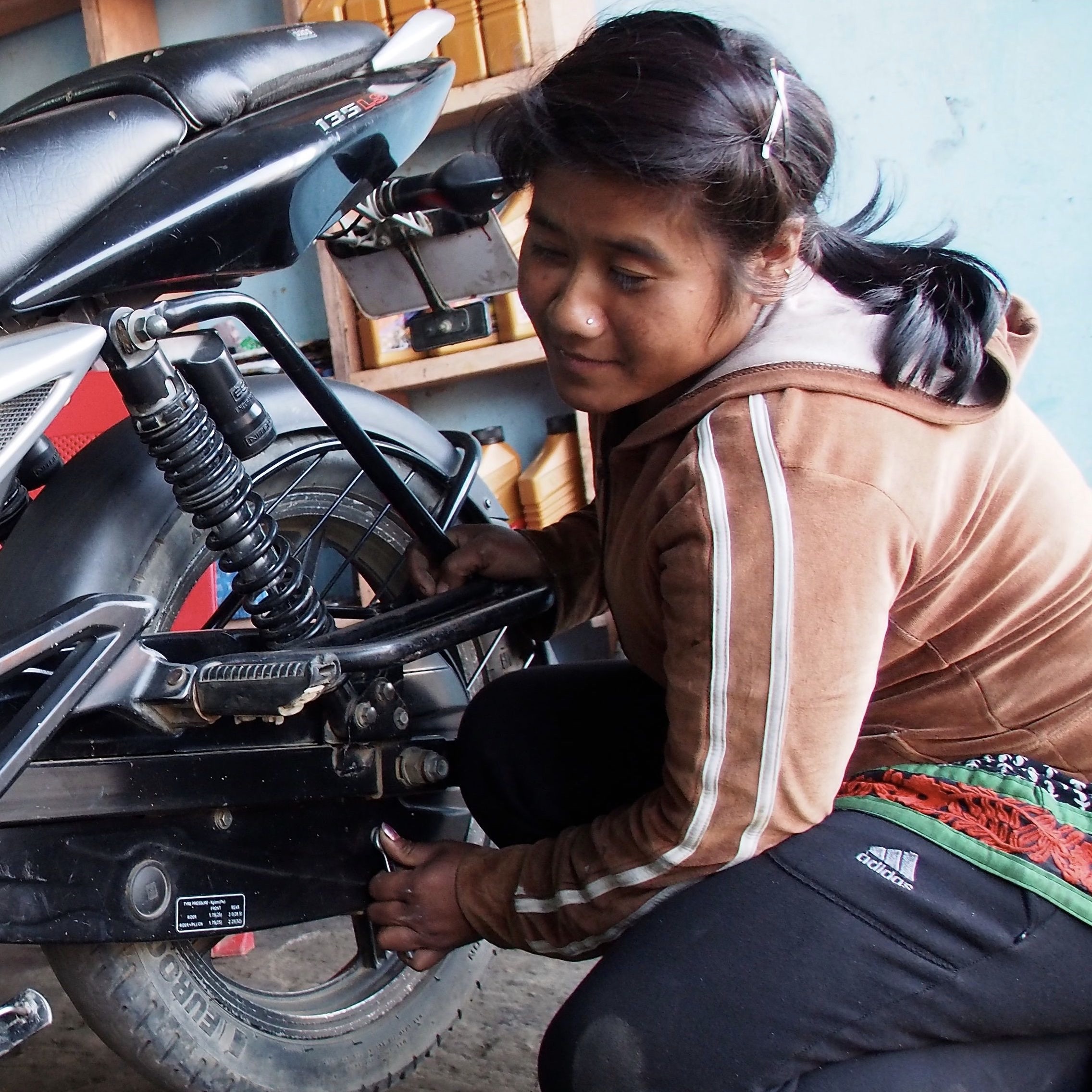
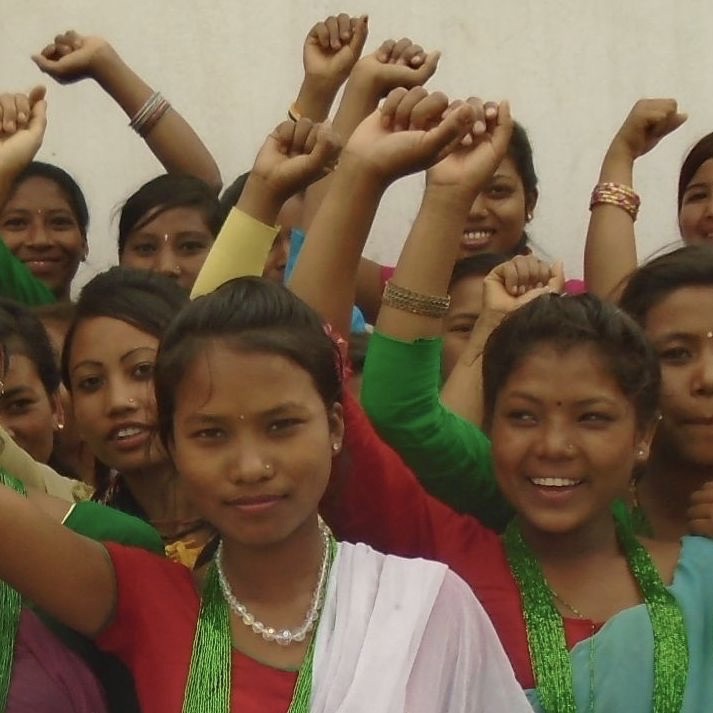
To continue supporting girls freed from kamlari bondage as they establish their own small businesses, you may do so through gifts to our Vocational Education and Career Counseling program. If you’d like to help us prevent early marriage during the COVID crisis, please consider a gift towards Access to Education. Donate here!